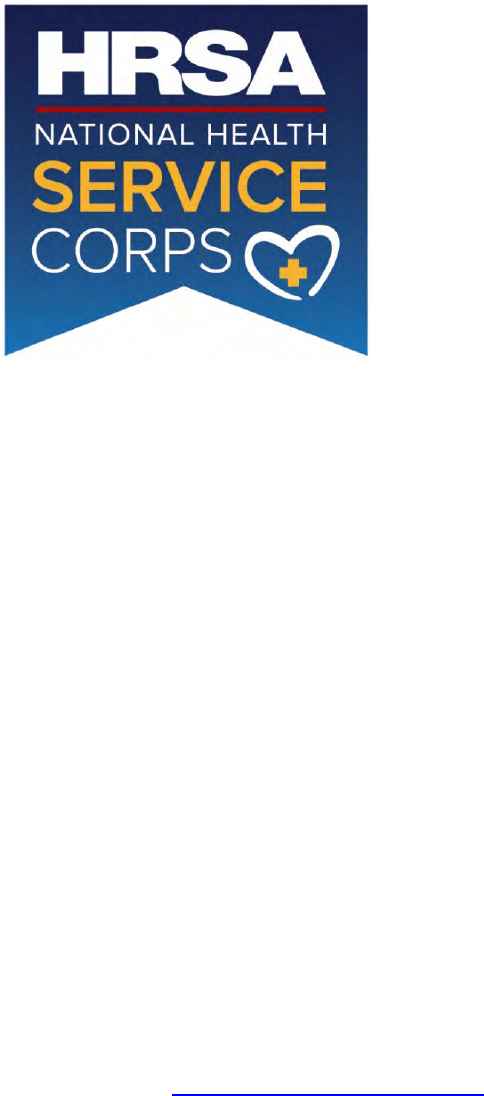
1
National Health Service Corps
Site Reference Guide
May 2024
United States Department of Health and Human Services
Health Resources and Services Administration
Bureau of Health Workforce
5600 Fishers Lane
Rockville, Maryland 20857
Authority: Sections 331-336 of the Public Health Service Act (42 U.S.C. 254d-254h-1), as amended;
Sections 338C & 338D of the Public Health Service Act (42 U.S.C. 254m & 254n), as
amended. Future changes in the governing statute, implementing regulations and Program
Guidance may also be applicable to National Health Service Corps Sites.
2
TABLE OF CONTENTS
PURPOSE .................................................................................................................................... 4
PAPERWORK REDUCTION ACT PUBLIC BU RDEN STATEMENT ...................................................... 4
PROGRAM OVERVIEW ................................................................................................................ 5
INTRODUCTION ............................................................................................................... 5
ELIGIBILITY REQUIREMENTS AND QUALIFICATION FACTORS.............................................. 6
PROGRAM REQUIREMENTS, REQUIRED DOCUMENTS, AND EXEMPTIONS ......................... 7
HEALTH PROFESSIONAL SHORTAGE AREAS................................................................8
SLIDING FEE DISCOUNT PROGRAM ......................................................................... 10
NON-DISCRIMINATION ........................................................................................... 14
CLINICIAN RECRUITMENT AND RETENTION PLAN .................................................... 14
COMPREHENSIVE PRIMARY CARE ........................................................................... 15
COMPREHENSIVE PRIMARY BEHAVIORAL HEALTH SERVICES.................................... 16
SUBSTANCE USE DISORDER SERVICES AND OPT-IN PROCESS ................................... 17
DATA REPORTING................................................................................................... 19
SUMMARY OF EXEMPTIONS BY SITE TYPE ............................................................... 20
NEW SITE APPLICATION AND RECERTIFICATION PROCESS ................................................22
SITE POINT OF CONTACT ROLES AND RESPONSIBILITIES ...................................................26
RECRUITING AND RETAINING A NATIONAL HEALTH SERVICE CORPS CLINICIAN.................31
SITE VISITS AND TECHNICAL ASSISTANCE .........................................................................33
GLOSSARY .................................................................................................................................37
APPENDIX A: SITE AGREEMENT ..................................................................................................46
APPENDIX B: SAMPLE NATIONAL HEALTH SERVICE CORPS PUBLIC NOTICE SIGNAGE ...................49
APPENDIX C ...............................................................................................................................50
SAMPLE SLIDING FEE DISCOUNT PROGRAM POLICY .........................................................50
SAMPLE SLIDING FEE DISCOUNT PROGRAM PATIENT APPLICATION .................................54
SAMPLE SLIDING FEE SCHEDULE......................................................................................56
APPENDIX D: MEDICATIONS FOR OPIOID USE DISORDER ATTESTATION LETTER TEMPLATE.........57
APPENDIX E: SAMPLE PATIENT NON-DISCRIMINATION POLICY....................................................58
APPENDIX F: SAMPLE CLINICAL RECRUITMENT AND RETENTION PLAN ........................................59

3
DEPARTMENT OF HEALTH & HUMAN SERVICES
Health Resources and Services
Administration
Rockville, MD 20857
Bureau of Health Workforce
A Letter from Luis Padilla, MD
Dear National Health Service Corps Site Applicant,
Thank you for your consideration and time in applying to the National Health Service Corps as a
new or recertifying
site. For over 50 years, the National Health Service Corps has fulfilled its
mission to connect a highly qualified and diverse group of health care professionals to people
with limited access to care. As we move forward, we need sites like yours that are committed to
providing care in high-need communities.
If your site is approved by the National Health Service Corps, we can assist you in recruiting,
hiring, and retaining clinicians. Specifically, we:
• Provide recruitment and retention incentives through our loan repayment and scholarship
programs for primary care clinicians who want to provide care to communities that are
underserved.
• Offer opportunities to recruit and retain qualified and dedicated primary care providers,
such as our Virtual Job Fairs, where you can meet and talk with job candidates.
• Help you promote your site and post job openings using the Health Workforce Connector,
our online job board.
• Provide you with direct access to state and territorial Primary Care Offices that help
increase access to primary health care services in your site’s community.
• Offer networking opportunities with more than 20,000 sites that provide care in high-need
communities.
We encourage you to read the National Health Service Corps Site Reference Guide and consider
applying t
o become a new or recertified site.
Sincerely,
/Luis Padilla, MD/
Luis Padilla, MD
Associate Administrator for Health Workforce
Director of the National Health Service Corps
Health Resources and Services Administration
U.S. Department of Health and Human Services

4
PURPOSE
The purpose of the National Health Service Corps Site Reference Guide is to provide clarity on site
eligibility requirements, qualification factors, compliance, roles, and responsibilities associated
with being a National Health Service Corps-approved site. This guide supplements the information
contained in the online National Health Service Corps Site Application.
The Health Resources and Services Administration expects sites to thoroughly review this
document prior to completing a Site Application or Recertification, and to allow ample time for
collection of required documents and application submission prior to the application cycle closing.
The Health Resources and Services Administration will update the National Health Service Corps
Site Reference Guide periodically with updated web links, changes to the governing National
Health Service Corps statute and regulations, and revised National Health Service Corps policies
and procedures.
The requirements outlined in this document apply to sites that submit a National Health Service
Corps Site Application in calendar year 2024, and all approved National Health Service Corps sites,
including those required to recertify in calendar year 2024. Additional information and program
changes applicable to National Health Service Corps sites, both current and those eligible to
participate, are available on the National Health Service Corps website and in the
online
application.
PAPERWORK REDUCTION ACT PUBLIC BURDEN STATEMENT
The purpose of this information collection is to obtain information for National Health Service
Corps site applicants. Health care facilities must submit a National Health Service Corps Site
Application or Site Recertification Application to determine the eligibility of sites to participate in
the National Health Service Corps as an approved service site. An agency may not conduct or
sponsor, and a person is not required to respond to, a collection of information unless it displays a
currently valid Office of Management and Budget control number. The Office of Management and
Budget control number for this information collection is 0915-0127 and it is valid until 3/31/2026.
This information collection is required to obtain or retain a benefit (Section 333 [254f] (a)(1) of
the Public Health Service Act). Public reporting burden for this collection of information is
estimated to average 0.5 hours per response, including the time for reviewing instructions,
searching existing data sources, and completing and reviewing the collection of information. Send
comments regarding this burden estimate or any other aspect of this collection of information,
including suggestions for reducing this burden, to the Health Resources and Services
Administration Reports Clearance Officer, 5600 Fishers Lane, Room 14N136B, Rockville, Maryland
20857.

5
PROGRAM OVERVIEW
INTRODUCTION
The National Health Service Corps is a federal government program administered by the U.S.
Department of Health and Human Services, Health Resources and Services Administration, Bureau
of Health Workforce, and created to address a growing primary care workforce shortage. Since
1972, the National Health Service Corps has been building healthy communities, ensuring access
to health care, preventing disease and illness, and caring for the most vulnerable populations who
may otherwise go without care. National Health Service Corps programs provide scholarships and
student loan repayment to health care professionals in exchange for a service commitment to
practice in designated Health Professional Shortage Areas
. Eligible sites providing comprehensive
primary care must become National Health Service Corps-approved BEFORE recruiting National
Health Service Corps participants or supporting National Health Service Corps loan repayment
applications from their existing clinician staff.
The H
ealth Resources and Services Administration, Bur
eau of Health Workforce, Division of
Regional Operations is responsible for reviewing and evaluating National Health Service Corps site
applications and recertifications to determine if sites meet program requirements and renders
the final approval or disapproval decision.
BENEFIT
S OF BEING A NATIONAL HEALTH SERVICE CORPS-APPROVED SITE
National Health Service Corps-approved sites can utilize National Health Service Corps Scholarship
and Loan Repayment Programs as incentives to help recruit and retain clinicians in eligible
primary health care, dental, and behavioral health disciplines. Additionally, many sites have
benefitted from National Health Service Corps clinicians who have remained in their communities
well beyond their original service obligation. National Health Service Corps-approved sites,
depending on eligibility, may be able to recruit individuals participating in one of several different
programs, including the following:
• National Health Service Corps Scholarship Program
• National Health Service Corps Students to Service Loan Repayment Program
• National Health Service Corps Loan Repayment Program
• National Health Service Corps Substance Use Disorder Workforce Loan Repayment
Program
• National Health Service Corps Rural Community Loan Repayment Program
All National Health Service Corps-approved sites receive the benefits of interactive access to
the Health Workforce Connector, an online platform that allows you to:
• Create, manage, and advertise new job vacancies and training positions to recruit National
Health Service Corps clinicians;

6
• Search candidate profiles where you can learn about the qualification factors, experience,
and other relevant information that highlight a candidate’s competencies; and
• View a comprehensive list of job seekers and students who have expressed interest in a
position you advertised on the Health Workforce Connector.
For more information on creating and managing the site profile, refer to the Site Point of Contact
User Guide. Additionally, review the Health Workforce Connector instructions.
ELIGIBILITY REQUIREMENTS AND QUALIFICATION FACTORS
ELIGIBLE SITE TYPES FOR NATIONAL HEALTH SERVICE CORPS APPROVAL
The following types of sites may be eligible to become a National Health Service Corps-approved
site (see the “Glossary” section for complete descriptions of site types).
Auto-Approved Sites
Other Eligible Sites
These sites are not required to apply for
approval as an NHSC site during the Site
Application cycles, or to recertify every
three (3) years. New sites must submit a
site application once they have become
operational, but may apply at any point
during the year*
These site types must submit a site application
during the New Site Application cycles and
recertify every three (3) years.
1) Federal prisons
2) Federally Qualified Health Centers
3) Federally Qualified Health Center
Look-Alikes
4) Immigration and Customs
Enforcement Health Service Corps
facilities
5) Indian Health Service facilities,
Tribally Operated 638 Health Programs,
Dual-Funded (Tribal Health Clinic and
Federally Qualified Health Center 330
Funded), Urban Indian Health Programs
and Indian Health Service hospitals (with
an affiliated outpatient clinic)
1) Centers for Medicare & Medicaid Services
Certified Rural Health Clinics
2) Community outpatient facilities
3) Critical Access Hospitals (with an affiliated
outpatient clinic)
4) Free clinics
5) Mobile units (that are not affiliated with a
Federally Qualified Health Center or Look-
Alike)
6) Private practices
7) School-based clinics (that are not affiliated
with a Federally Qualified Health Center or
Look-Alike)
8) State or local health departments
9) State prisons
10) Substance use disorder treatment facilities
* National Health Service Corps auto-approval is not guaranteed, and comprehensive primary care
sites seeking auto-approval must submit a Site Application to determine eligibility and participate
in the National Health Service Corps as an approved service site. “Operational" implies that the
site has completed its construction or setup phase and is now actively providing services.

7
INELIGIBLE SITE TYPES FOR NATIONAL HEALTH SERVICE CORPS APPROVAL
The following site types are not eligible to become National Health Service Corps-approved sites,
even if they are located in, or serve, a Health Professional Shortage Area.
Ineligible Site Types
1) Inpatient hospitals (except Centers for Medicare & Medicaid Services-certified Critical
Access Hospitals and some Indian Health Service hospitals)
2) Clinics that limit care to veterans and active-duty military personnel (for example,
Veterans Health Administration medical centers, hospitals and clinics, and military
treatment facilities)
3) Other types of inpatient facilities and inpatient rehabilitation programs
4) Residential facilities
5) Local/county/city/private correctional facilities
6) Home-based health care settings of patients or clinicians
7) Specialty clinics and/or service-specific sites limited by gender identity, organ system,
illness, categorical population, or service (for example, clinics that only provide sexually
transmitted diseases/human immunodeficiency virus/tuberculosis services)
8) Facilities that provide 100 percent telehealth services
TELEHEALTH, HOME HEALTH, AND ALTERNATIVE SETTINGS
The National Health Service Corps recognizes telehealth services as patient care when both the
originating site (location of the patient) and the distant site (location of the National Health
Service Corps participant) are located in a Health Professional Shortage Area and are National
Health Service Corps-approved. Telehealth may be conducted to or from an approved alternative
setting as directed by the participant's National Health Service Corps-approved site.
The National Health Service Corps does not recognize the homes of patients or providers as
National Health Service Corps-approved service sites. As such, home visits may only be conducted
at the direction of the National Health Service Corps-approved service site and in the approved
alternative setting allotment for patient care.
Sites that provide 100 percent telehealth services do not qualify for the National Health Service
Corps, considering participants will not receive service credit for telehealth delivered services that
exceed more than 75 percent of the minimum weekly hours required to provide direct care under
their National Health Service Corps contracts. For more information, refer to the appropriate
National Health Service Corps Application and Program Guidance.
PROGRAM REQUIREMENTS, REQUIRED DOCUMENTS, AND EXEMPTIO
NS
The following sections outline the program requirements for National Health Service Corps-
approved sites, including required documents and exceptions by site type. Depending on the site
type, the required documents must be submitted at the time of a New Site Application, site
recertification, site visit, or upon request to determine site eligibility.

8
HEALTH PROFESSIONAL SHORTAGE AREAS
The Health Resources and Services Administration designates medical, dental, and mental health
Health Professional Shortage Areas to indicate shortages of primary care health professionals in
geographic areas (for example, county), population groups (for example, low-income), and
facilities (for example, correctional facilities). The National Health Service Corps uses these scores
to determine priorities for the assignment of clinicians.
National Health Service Corps-approved sites must:
• Be located in and treat patients from a federally designated Health Professional Shortage
Area.
• Have a designated Health Professional Shortage Area for the specific category a National
Health Service Corps clinician would serve.
o For example, a National Health Service Corps-approved site would need to have a
primary care shortage designation to recruit an internal medicine physician, a mental
health shortage designation to recruit a psychiatrist, and a dental shortage designation
to recruit a dentist.
o Sites providing substance use disorder services may use either a primary care or
mental health professional shortage designation for the purpose of recruiting National
Health Service Corps Substance Use Disorder Workforce Loan Repayment Program and
National Health Service Corps Rural Community Loan Repayment Program
participants, even if the sites do not provide primary medical care.
Contact your state/territorial Primary Care Office
when applying for, or inquiring about, a Health
Professional Shortage Area designation. For more information about shortage areas, including
scoring, visit the Health Resources and Services Administration Shortage Designation webpage.
Required Documents and Exceptions
Most site types are not required to submit documentation to demonstrate they are located in a
Health Professional Shortage Area, as this is determined by existing data located in the Bureau of
Health Workforce Shortage Designation and Management System. However, mobile units that are
not part of a Federally Qualified Health Center and/or a Health Center must submit
documentation. Please find more information under the “Mobile Units” section of this document.
Centers for Medicare & Medicaid Services-Certified Rural Health Clinics
Centers for Medicare & Medicaid Services-Certified Rural Health Clinics are not required to be in
geographic or population Health Professional Shortage Areas to apply for site approval. For your
clinic to receive an auto-designation:
• You should submit an application, and under the section “Confirm Site Details,” include
your Certification Number, so we can apply the facility shortage-area designation score.
Please use the Centers for Medicare & Medicaid Services directory
to verify your
Certification Number. Ensure the address you enter in the site application matches the

9
address connected to the Certification Number provided by the Centers for Medicare &
Medicaid Services.
• If we approve your application, we calculate your auto-designation score and notify your
site and the state/territorial Primary Care Office.
• If the National Health Service Corps approves your Site Application, but your site is not in a
geographic or population Health Professional Shortage Area, the site will remain inactive
until we calculate the auto-designation score. After the shortage designation scores are
confirmed, the site will convert to an active site and will be able to participate in the
applicable National Health Service Corps programs.
Correctional or Detention Facilities
An eligible correctional facility can only use facility Health Professional Shortage Areas designated
for that site. Correctional facilities do not serve patients of the general population, so they cannot
use geographic or population designations for National Health Service Corps site approval. You
must contact your state/territorial Primary Care O
ffice to apply and obtain your correctional
facility designation before applying to become a National Health Service Corps-approved site.
Indian Health Service Facilities, Tribally Operated 638 Health Programs, Urban Indian Health
Programs, and Indian Health Service Hospitals
Your Indian Health Service facilities, Tribally Operated 638 Health programs, Urban Indian Health
programs, or Indian Health Service hospital site must have an “Area, Service Unit, Facility Code”
number to receive auto-Health Professional Shortage Area designations. However, the Indian
Health Service may assign “Area, Service Unit, Facility Code” numbers to a variety of
administrative offices and facilities that do not meet the requirements for National Health Service
Corps-site eligibility. For example, Indian Health Service facilities, Tribally Operated 638 Health
programs, Urban Indian Health programs, or Indian Health Service hospitals that are substance
use disorder-only sites do not qualify for auto-designation. However, they can apply to the
National Health Service Corps using geographic, population, and/or other facility Health
Professional Shortage Areas.
• You must include your “Area, Service Unit, Facility Code” number, under the
application section “Confirm Site Details,” so we can attach its facility scores.
• You must contact the
Bureau of Health Workforce Division of Policy and Shortage
Designation to apply and obtain your auto-Health Professional Shortage Area
designation before applying to the National Health Service Corps.
Mobile Units
The National Health Service Corps recognizes Mobile units/clinics (that are not part of a Federally
Qualified Health Center and/or a Health Center) as medical vehicles (for example, mobile health
vans) that travel to underserved rural and urban communities, providing a majority (>50 percent)
of primary care services to individuals located in a Health Professional Shortage Area. To
demonstrate that your mobile unit provides a majority (>50 percent) of primary care services to

10
individuals located in Health Professional Shortage Areas, you must provide the following when
applying, recertifying, during a site visit, or upon request:
• A list of the locations where the mobile unit stops; or
• An attestation letter stating that at least 50 percent of your mobile unit stops are in Health
Professional Shortage Areas.
SLIDING FEE DISCOUNT PROGRAM
Your site must use a Sliding Fee Discount Program to ensure patients have access to all primary
care services regardless of their ability to pay. Eligibility for your Sliding Fee Discount Program
must be:
• Based solely on family size and income; and
• At a minimum, applicable
to all individuals and families with annual incomes at or below
200 percent of the most current Federal Poverty Guidelines.
The implementation of a Sliding Fee Discount Program is intended to minimize financial barriers
to care for patients at or below 200 percent of the current Federal Poverty Guidelines. Therefore,
the required fees and the process of assessing patient eligibility and collecting payments must not
create barriers to care.
The components of your Sliding Fee Discount Program for National Health Service Corps-approved
sites must include a policy, a patient application, a sliding fee schedule, a posted signage, and an
online statement.
Your site must have a Sliding Fee Discount Program in place for at least six consecutive months
before applying to become a National Health Service Corps-approved site and continuously
thereafter.
National Health Service Corps-approved sites must apply the Sliding Fee Discount Program for
eligible patients with third party insurance coverage unless the third party insurance contract
prohibits the application of the Sliding Fee Discount Program. These patients may also be eligible
for the Sliding Fee Discount Program based on income and family size. For example, the Medicare
law requires clinicians to charge Medicare beneficiaries the same as they charge other patients.
Medicare will accept Sliding Fee Discount Program discounts as long as the Sliding Fee Discount
Program discount policy is uniformly applied to all patients.

11
Sliding Fee Discount Program Policy
All aspects of your Sliding Fee Discount Program should be based on written policies, applied
uniformly to all patients (including both uninsured and underinsured), and supported by
operating procedures. At a minimum, your policy must address the following areas:
• Patient eligibility, including:
o Frequency of patient eligibility re-evaluation
o Income definition
o Family size definition
• Documentation and verification requirements to determine patient eligibility.
• How your site advertises the Sliding Fee Discount Program to the patient population to
increase access to care.
• An explanation and amount of nominal charges, including the site’s policies on how it
establishes and collects nominal charges (for example, what constitutes “refusal to pay”).
• Description of its collection policies for outstanding debt (if applicable to Sliding Fee
Discount Program patients).
Sliding Fee Discount Program Patient Application
Your Sliding Fee Discount Program application should be limited to family size and income
questions.
Additional questions that should not be included in the Sliding Fee Discount Program application
include those related to a patient’s Social Security number, citizenship status, housing status, or
marital status. Sites also must not use credit checks, payment history, Medicaid denial letters,
asset tests, or “net worth” (combining assets and income) tests when determining eligibility for
individuals and families with annual incomes at or below 200 percent of the most current Federal
Poverty Guidelines.
Sliding Fee Schedule
Your site must use a schedule of fees or payments for services consistent with locally prevailing
rates or charges designed to cover your site’s reasonable cost of operation. Once your site has
established its fee schedule, it must develop a corresponding Sliding Fee Schedule to ensure that
uniform and reasonable fees and discounts are applied to all eligible patients. You must base your
Sliding Fee Schedule on income and family size, and at a minimum, you should revise it annually
to reflect updates to the Federal Poverty Guidelines. The Sliding Fee Schedule should cover all
primary care services for the site type.
Specifically, your site’s Sliding Fee Schedule must:
• Provide a full discount (no charge) for individuals and families with annual incomes at or
below 100 percent of the most current Federal Poverty Guidelines, with allowance for a
nominal charge only, consistent with your site’s Sliding Fee Discount Program policy. The
nominal charge must be less than the fee paid by a patient in the first “sliding fee discount
pay class” beginning above 100 percent of the Federal Poverty Guidelines;

12
• Provide services at a nominal charge, which can be in the form of a sliding fee, or schedule
of discount, to individuals and families with incomes above 100 percent and at or below
200 percent of the Federal Poverty Guidelines; and
• Use nominal charges at a financial level that does not reflect the service’s true value and
does not create a barrier to care for patients. The nominal charge must not be a threshold
for receiving care and, thus, must not be a minimum fee or co-payment.
You have discretion regarding how you structure your Sliding Fee Schedule, including the number
of discount pay classes and the types of discounts (percentage of fee or fixed/flat fee for each
discount pay class). However, when developing your Sliding Fee Schedule, you should consider
the unique characteristics of your Health Professional Shortage Area populations (e.g., low-
income or homeless) to ensure it does not present a barrier to care.
Your site must make every reasonable effort to secure payment in accordance with the schedule
of fees or schedule of discounts from the patient and/or any other third party. Your site must
accept assignments for Medicare beneficiaries and enter into an appropriate agreement with the
applicable state agency for Medicaid and Children's Health Insurance Program beneficiaries, but
your site cannot require Medicare, Medicaid, or Children’s Health Insurance Program
application or proof of denial before allowing a patient to apply and be eligible for the Sliding
Fee Discount Program.
Posted Signage
Your site must prominently display a statement in common areas and its official website (if one
exists) that explicitly states that:
• No one will be denied access to services due to inability to pay, and
• There is a discounted/sliding fee schedule available based on family size and income.
If your site does not have an official website, then that statement must be posted on your social
media platforms (if one exists).
When applicable, you should translate this statement into the most prevalent languages/dialects
spoken by your patients.
Required Documents and Exceptions
To demonstrate that your site is using a Sliding Fee Discount Program, you must provide the
following for National Health Service Corps site approval:
• Copy of your site’s Sliding Fee Discount Program policy;
• Copy of your site’s Sliding Fee Discount Program patient application;
• Copy of your site’s Sliding Fee Schedule;
13
• Two clear photos and a screenshot of your site’s posted signage;
o The first photo should show the common area, and the sign prominently displayed
to ensure it is visible to patients;
o The second photo should be a close-up of the posted signage showing the legible
text;
o A document with the screenshot and link to the published online statement from
your site’s official website (if one exists) or social media platforms (when
applicable).
Free
Clinics
Free clinics are exempt from providing the required Sliding Fee Discount Program documentation,
however, must provide documentation that no one is charged or billed for services, and
individuals are not denied service because of inability to pay, at the point of application,
recertification, site visit, or upon request.
Federally Qualified Health Centers and Federally Qualified Health Centers Look-Alikes
Federally Qualified Health Centers and Federally Qualified Health Centers Look-Alikes are exempt
from providing the required Sliding Fee Discount Program documentation at the point of
application but must provide it during a site visit or upon request.
Indian Health Service facilities, Tribally Operated 638 Health programs, Urban Indian Health
programs, Indian Health Service hospitals, federal prisons, Immigration and Customs Enforcement
Health Service Corps sites, and state prisons.
Indian Health Service facilities, Tribally Operated 638 Health programs, Urban Indian Health
programs, Indian Health Service hospitals, federal prisons, Immigration and Customs Enforcement
Health Service Corps sites, and state prisons are exempt from providing the required Sliding Fee
Discount Program documentation at the point of application, but must provide documentation
that no one is charged or billed for services, and individuals are not denied service because of
inability to pay during site visits or upon request. If a small fee is charged for service, please
provide the fee policy to ensure it does not create a barrier to access care.
Critical Access Hospitals
Critical Access Hospitals must utilize the National Health Service Corps-approved Sliding Fee
Discount Program, at a minimum, for low-income patients receiving primary care services in both
the emergency room and the affiliated outpatient clinic. The Sliding Fee Discount Program
requirements do not extend to the Critical Access Hospital inpatient fee structure (that is, the
Critical Access Hospital in-house discounted fee schedule or charity care program for other
settings) or for requirements necessary to meet Medicare certification requirements. Critical
Access Hospitals must submit all the Sliding Fee Discount Program required documents at the
point of application, recertification, site visit, or upon request.

14
NON-DISCRIMINATION
Your site must not discriminate in the provision of services based on an individual’s:
• Inability to pay;
• Medicare, Medicaid, or Children Health Insurance Program coverage; or
• Race, color, sex, national origin, disability, religion, age, sexual orientation, or gender
identity.
Required Documents and Exceptions
To demonstrate that your site is not discriminating in the provision of services, you must provide
a copy of your site’s policies on nondiscrimination for site approval. Refer to Appendix E
for a
sample document.
Indian Health Service facilities, Tribally Operated 638 Health programs, Urban Indian Health
programs, and Indian Health Service hospitals are exempt from providing documentation for this
program requirement. The following sites are not required to submit a copy of the site’s policies
on nondiscrimination when applying for NHSC site approval, but must provide it during a site visit
or upon request:
• Federally Qualified Health Centers
• Federally Qualified Health Centers Look-Alikes
• Federal prisons
• Immigration and Customs Enforcement Health Service Corps sites
• State prisons
CLINICIAN RECRUITMENT AND RETENTION PLAN
Your site must maintain a clinician recruitment and retention plan with the policies and processes
your site will use to recruit and maintain clinical staffing levels needed to serve the community
appropriately, including specific strategies to promote clinician resiliency and reduce burnout.
As mandated by the National Health Service Corps statute, Section 333 of the Public Health Service
Act, 42 U.S.C. 254f, National Health Service Corps sites must make appropriate and efficient use of
assigned National Health Service Corps clinicians. A National Health Service Corps determination
that the National Health Service Corps site has not made appropriate and efficient use of National
Health Service Corps clinicians may be grounds for National Health Service Corps site disapproval
and/or deactivation.
A solo Private Practice’s Clinician Recruitment and Retention Plan must include the following:
• Recruitment and retention strategies for any potential expansion to meet community
needs,
• Strategies aimed at promoting clinician resiliency and reducing burnout regarding their
own well-being, and
• Contingencies should the provider no longer be able to serve patients.

15
Required Documents and Exceptions
To demonstrate that your site maintains a clinician recruitment and retention plan, you must
provide a copy of your site’s clinician recruitment and retention plan for site approval. Refer to
Appendix F
for a sample document.
The following sites are not required to submit the clinician recruitment and retention plan at the
point of application, but must provide it during a site visit or upon request:
• Federally Qualified Health Centers
• Federally Qualified Health Centers Look-Alikes
• Indian Health Service facilities, Tribally Operated 638 Health programs, Urban Indian
Health programs, and Indian Health Service hospitals
• Federal prisons
• Immigration and Customs Enforcement Health Service Corps sites,
• State prisons
COMPREHENSIVE PRIMARY CARE
Your site must provide comprehensive primary care (medical, dental, and/or mental/behavioral),
which corresponds to its designated Health Professional Shortage Area type. The National Health
Service Corps defines comprehensive primary care as a continuum of care not focused or limited
to gender identity, organ system, a particular illness, or categorical population (for example.,
those who are developmentally disabled or those with cancer). Your site must also function as
part of a system of care that either offers or ensures access to ancillary, inpatient, and specialty
referrals.
With the exception of substance use disorder treatment facilities, if your site does not offer all
primary care services, it must provide an appropriate set of primary care services necessary for
the community or populations you serve. For example, a site serving a senior population must
provide geriatric primary care services.
Required Documents and Exceptions
To demonstrate that your site is providing culturally competent comprehensive care, you must
upload proof of referral arrangements for ancillary, inpatient, and specialty care that are not
available on-site. Acceptable documents include current and signed Memorandums of
Understanding, signed Memorandums of Agreement, or signed contracts with ancillary, inpatient,
and specialty facilities. If formal referral arrangements do not exist, the site must provide a dated
and signed description of how it ensures patient access to ancillary, inpatient, and specialty care.
The following sites are not required to submit proof of referral arrangements for ancillary,
inpatient, and specialty care that are not available on-site at the point of application, but must
provide it during a site visit or upon request:
• Federally Qualified Health Centers
• Federally Qualified Health Centers Look-Alikes
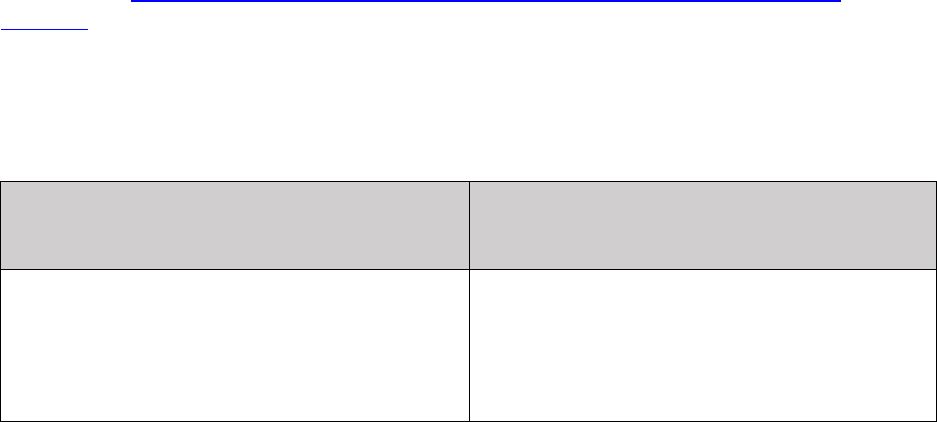
16
• Indian Health Service facilities, Tribally Operated 638 Health programs, Urban Indian
Health programs, and Indian Health Service hospitals
• Federal prisons
• Immigration and Customs Enforcement Health Service Corps sites
• State prisons
COMPREHENSIVE PRIMARY BEHAVIORAL HEALTH SERVICES
Facilities offering comprehensive primary behavioral health services must be located in and serve
their mental health-designated Health Professional Shortage Area.
Your behavioral health service site should:
• Provide core comprehensive behavioral health services on-site, which include:
o Screening and assessment
o Treatment plan
o Care coordination
• Offer non-core comprehensive behavioral health services either on-site, in-network, or
off-site, through referral, affiliation, or contract, which include:
o Diagnosis
o Therapeutic services
o Crisis/emergency services
o Consultative services
o Case management
Required Documents and Exceptions
To demonstrate that your site provides comprehensive behavioral health services, you must
provide the following for site approval:
• A completed
National Health Service Corps Comprehe
nsive Behavioral Health Services
Checklist. During application cycles, you will directly enter this data in the Behavioral
Health section of the electronic application; and
• Documentation demonstrating the provision of core and non-core com
prehensive
behavioral health services. Acceptable documentation varies depending on where the
service is provided:
Your site must provide at least one of the
following for services provided on-site (Core
and Non-Core):
Your site must provide at least one of the
following for each service provided off-site
or out-of- network (Non-Core):
• Operating certificate issued by the state,
territory, county, etc.
• Site brochure listing the behavioral health
services
•
Site policy that outlines the behavioral
• Affiliation agreements
• Memorandums of
understanding/agreement
• Contracts
•
Letters of referral

17
Your site must provide at least one of the
following for services provided on-site (Core
and Non-Core):
Your site must provide at least one of the
following for each service provided off-site
or out-of- network (Non-Core):
health services
• Document that includes the website link
and screenshot of available behavioral
health services
• Other documentation that outlines
behavioral health services provided on-
site
• Letters of support/commitment
• Referral and follow-up policy and
procedures
Primary care sites that do not provide behavioral health services are exempt from this program
requirement. In addition, the following sites are exempt from providing documentation for this
program requirement:
• Federally Qualified Health Centers
• Federally Qualified Health Centers Look-Alikes
• Indian Health Service facilities, Tribally Operated 638 Health programs, Urban Indian
Health programs, and Indian Health Service hospitals
• Federal prisons
• Immigration and Customs Enforcement Health Service Corps sites
• State prisons
• Substance Abuse and Mental Health Services Administration-Certified Opioid Treatment
Programs
Mental Health Opt-in Process for Approved National Health Service Corps Sites
If your site is already approved for the National Health Service Corps but later adds mental health
services to its program scope, you can submit documentation at any time to opt-in for mental
health eligibility by sending a Portal inquiry and uploading a completed
National Health Service
Corps Comprehensive Behavioral Health Services Checklist and supporting documentation for on-
site and off-site services.
• In the Bureau of Health Workforce Customer Service Portal, select “Ask a question,” enter
the category “Behavioral Health Policy Certification,” and use the description “Mental
Health Expansion.” Within the inquiry, enter mental health services provided on-site, and
upload the completed checklist and supporting documentation.
SUBSTANCE USE DISORDER SERVICES AND OPT-IN PROCESS
Your site must first be approved for substance use disorder services for your clinicians to apply to
the National Health Service Corps substance use disorder-specific loan repayment programs,
including the National Health Service Corps Substance Use Disorder Workforce Loan Repayment
Program and the National Health Service Corps Rural Community Loan Repayment Program.

18
Required Documents and Exceptions
To demonstrate your site provides substance use disorder services on-site, you must provide the
following during the New Site Application cycle, Site Recertification cycle, site visit, or upon
request:
• Documentation demonstrating the provision of on-site substance use disorder services.
Acceptable documentation, depending on the service type, includes:
o Substance Use or Addiction Counseling/Psychotherapy Services – Submit one of
the following:
• Substance use disorder operating certificate issued by the state,
territory, county, etc.
• Site brochure listing the on-site substance use disorder services
• Site policy that outlines on-site substance use disorder services
• Document that includes the website link and screenshot of available on-
site substance use disorder services
• Other documentation that outlines on-site substance use disorder
services provided on-site
o Medications for Opioid Use Disorder Services – Submit an attestation letter from
the site Chief Executive Officer or Medical Director stating:
• That the site offers medications for opioid use disorder on-site,
• The days and hours when the site offers medications for opioid use
disorder services, and
• The size of the patient panel receiving medications for opioid use
disorder services for the most recent six-month period within the last
12 months.
For an attestation letter template, please see Appendix F
: Medications for Opioid
Use Disorder Attestation Letter Template.
If your sit
e is a primary care medical facility, you should also complete the National Health Service
Corps Comprehensive Behavioral Health Services Checklist and supporting documentation.
Primary care medical sites that do not provide substance use disorder services are exempt from
this program requirement.
The following sites are not required to submit the required substance use disorder
documentation at the point of application, but must provide it during a site visit or upon request:
• Federally Qualified Health Centers
• Federally Qualified Health Centers Look-Alikes
• Indian Health Service facilities, Tribally Operated 638 Health programs, Urban Indian
Health programs, and Indian Health Service hospitals
• Federal prisons

19
• Immigration and Customs Enforcement Health Service Corps sites,
• Substance Abuse and Mental Health Services Administration-Certified Opioid Treatment
Programs
Substance Use Disorder Opt-in Process for Approved National Health Service Corps Sites
If your site is already approved for the National Health Service Corps but later adds substance use
disorder services to its program scope, you can submit documentation at any time to opt-in for
substance use disorder eligibility by sending a portal inquiry and uploading the required
substance use disorder documentation.
• In the Bureau of Health Workforce Customer Service Portal
, select “Ask a question,” enter
the category “Substance Use Disorder (SUD) Documentation,” and use the description
“Opt-in SUD Expansion.” Within the inquiry, enter substance use disorder services
provided on-site, and upload all required substance use disorder documentation.
Approved Site Upload the following documentation to the inquiry
Primary Care Medical Sites
1) Completed National Health Service Corps Comprehensive
Behavioral Health Service checklist and required behavioral
health documentation; and
2) Substance use disorder documentation
Behavioral Health Sites
Substance use disorder documentation
Rural Designation
Only clinicians working at a rural National Health Service Corps-approved site that provides
substance use disorder services are eligible to apply for the National Health Service Corps Rural
Community Loan Repayment Program. Rural National Health Service Corps-approved sites are in a
Rural-Urban Commuting Area (RUCA) Census Tract designated by the Health Resources and
Services Administration. To determine if your site is considered “rural” for purposes of the
National Health Service Corps Rural Community Loan Repayment Program, use the Rural Health
Grants Eligibility Analyzer.
DATA REPORTING
You must include site-specific data in the “Services and Staffing” and “Payments and Insurance”
sections of the National Health Service Corps site application. We evaluate this data to determine
your site’s adherence to sound fiscal management policies, access to care for the most vulnerable
populations, and ability to support the clinical practice of potential National Health Service Corps
clinicians.
Required Documents and Exceptions
• For site approval, you must submit site-specific data with up-to-date information for the
preceding six (6) months. You must enter this data directly in the “Services and Staffing”
and “Payments and Insurance” sections of the application.
• During site visits or upon request, you must submit this data
using the National Health
Service Corps Site Data Tables.
20
The following sites are not required to submit the Site Data Tables at the point of application, but
may be required to provide them during a site visit or upon request:
• Indian Health Service facilities, Tribally Operated 638 Health programs, Urban Indian
Health programs, and Indian Health Service hospitals
• Federal prisons
• Immigration and Customs Enforcement Health Service Corps sites
• State prisons
Federally Qualified Health Centers, and Federally Qualified Health Centers Look-Alikes are exempt
from providing Site Data Tables for this program requirement at the point of application, but we
may require a copy of the latest standard Health Resources and Services Administration/Bureau
of Primary Health Care Uniform Data System (UDS) report during a site visit or upon request.
SUMMARY OF EXEMPTIONS BY SITE TYPE
This table lists the various required documents for National Health Service Corps site approval, by
site type, and shows when each document may be required.
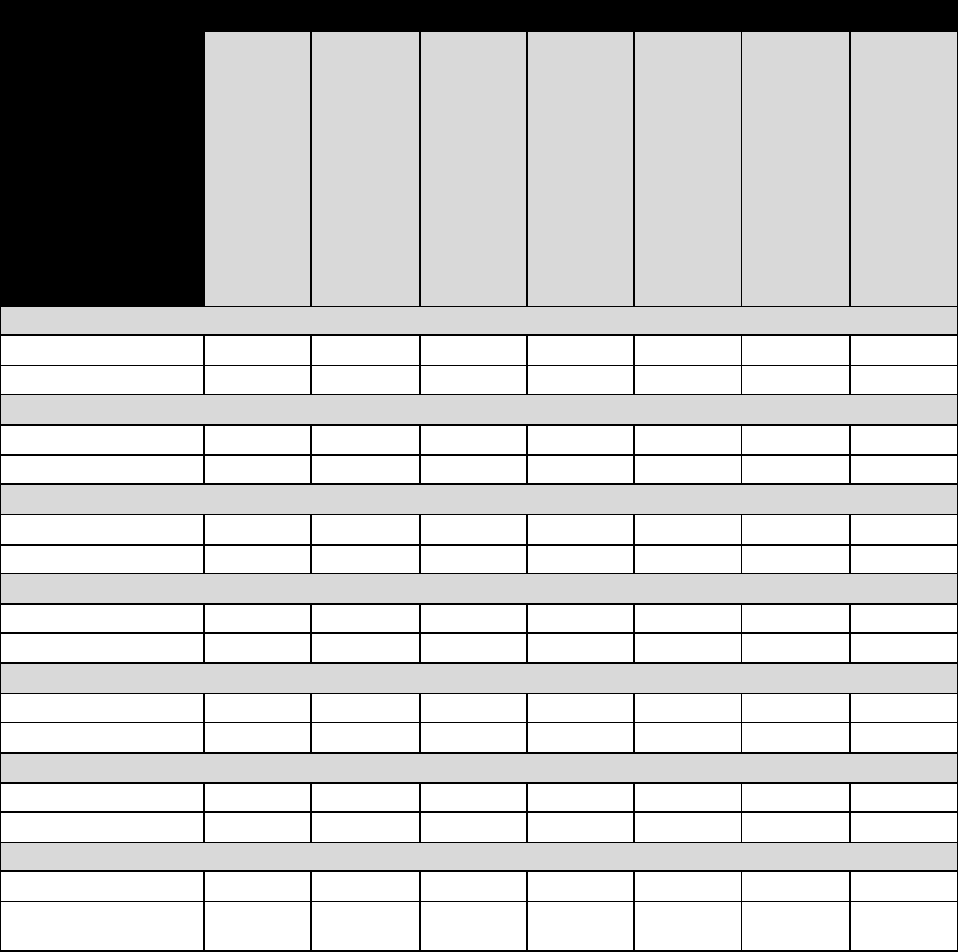
21
Required Documents
and
Submission Time
National Health Service Corps Site Types and Document Exemptions/Requirements
□Immigration
and Customs
Enforcement
□Federal
Prison
□Federally
Qualified
Health Center
□Look-Alike
□Indian Health
Service
Facilities
□Tribally
Operated 638
Healt h
Programs
□Dual-Funded
Facilities
□Urban Indian
Healt h
Programs, and
□Indian Health
Hospitals
Free Clinic State Prison
Substance
Abuse and
Mental Healt h
Services
Administrat ion
Opioid
Treatment
Program
All ot her site
types**
Sliding Fee Discount Program Documentation
Application/Recertification
EXEMPT
EXEMPT
EXEMPT
Other*
EXEMPT
Required
Required
Site Visits or Upon Request
Other*
Required
Other*
Other*
Other*
Required
Required
Non-Discrimination Policy
Application/Recertification
EXEMPT
EXEMPT
EXEMPT
Required
EXEMPT
Required
Required
Site Visits or Upon Request
Required
Required
EXEMPT
Required
Required
Required
Required
Clinician Recruitment and Retention Plan
Application/Recertification
EXEMPT
EXEMPT
EXEMPT
Required
EXEMPT
Required
Required
Site Visits or Upon Request
Required
Required
Required
Required
Required
Required
Required
Proof of Access to Comprehensive Care Documentation
Application/Recertification
EXEMPT
EXEMPT
EXEMPT
Required
EXEMPT
Required
Required
Site Visits or Upon Request
Required
Required
Required
Required
Required
Required
Required
Behavioral Health Services Checklist and Supporting Documentation
Application/Recertification
EXEMPT
EXEMPT
EXEMPT
Required
EXEMPT
EXEMPT
Required
Site Visits or Upon Request
EXEMPT
EXEMPT
EXEMPT
Required
EXEMPT
EXEMPT
Required
Substance Use Disorder/ Medications for Opioid Use Disorder Documentation
Application/Recertification
EXEMPT
EXEMPT
EXEMPT
Required
Required
EXEMPT
Required
Site Visits or Upon Request
Required
Required
Required
Required
Required
Required
Required
Data Reporting
Application/Recertification
EXEMPT
EXEMPT
EXEMPT
Required
EXEMPT
Required
Required
Site Visits or Upon Request
Required
UDS
Report
Required Required Required Required Required
*Other: These sites need to provide documentation that no one is charged or billed for services,
and individuals are not denied service because of inability to pay.
**All Other Site Types: Critical Access Hospitals, State or local health departments, community
outpatient facilities, private practices, school-based clinics, mobile units, Office-based Opioid
Treatment facilities, and Non-Opioid Outpatient Substance Use Disorder Treatment facilities.

22
NEW SITE APPLICATION AND RECERTIFICATION PROCESS
NEW SITE APPLICATION CYCLE
The National Health Service Corps New Site Application Cycle is open for non-auto-approved sites
that have never been approved for the National Health Service Corps and sites that were
previously approved but are now “inactive” or “terminated,” as indicated on the Bureau of Health
Workforce Customer Service Portal Site Dashboard. You can also check the status of these sites in
the Health Workforce Connector; inactive or terminated sites will not display “NHSC Active Site”
under Site Status.
The National Health Service Corps generally opens one New Site Application Cycle annually, which
remains open for approximately six to eight weeks. Subscribe to be notified when the next New
Site Application Cycle opens. Cycle dates and submission deadlines are subject to change. Check
the National Health Service Corps website for updates.
SITE RECERTIFICATION CYCLE AND EXPIRATION
The Recertification Cycle applies only to non-auto-approved sites that display “active” under
program on the Bureau of Health Workforce Customer Service Portal
Site Dashboard and have an
expiration date. Also, these sites display “NHSC Active Site” under Site Status on the Health
Workforce Connector. Auto-approved sites do not have to recertify and do not have an expiration
date.
For non-auto-approved sites, their National Health Service Corps site approval is valid for three (3)
years as long as the site remains compliant with all program requirements. Sites with an approval
expiration date on or before December 31, 2024, are required to submit a Recertification
Application during the 2024 Site Recertification Application Cycle. As the site Point of Contact, you
will receive a reminder under the “Messages” tab in your Bureau of Health Workforce Custome
r
Service Portal account to recertify your site prior to the expiration date. You should monitor the
expiration dates for each approved site to ensure they do not expire and become inactive.
The National Health Service Corps generally opens one Recertification Cycle annually, which
remains open for approximately six to eight weeks. Cycle dates and submission deadlines are
subject to change. Check the National Health Service Corps website for updates.
SITE APPROVAL PROCESS
The approval of a National Health Service Corps New Site or Recertification Application is based
on the ability of a site to demonstrate it meets the eligibility criteria set forth in the National
Health Service Corps Site Reference Guide (this document) and the National Health Service Corps
Site Agreement, and as determined by the Health Resources and Services Administration. As the
point of contact who will be submitting an application, you are responsible for ensuring that the
information reported is true and accurate, and that your answers on the application are
confirmed and supported by the required documents. An application that is submitted without all
required and legible documents or is missing required language or data/information will be
deemed incomplete and may be disapproved. An application may not be altered after submission.

23
APPLICATION REVIEW, EVALUATION, AND FINAL DECISION
Once you submit an application, within 21 days, your state/territorial Primary Care Office will
review it to determine if your site is eligible for the National Health Service Corps and meets all
requirements. They will enter comments and recommendations to approve/disapprove your
application. Next, we will review it and render a final decision.
The approv
al of a network’s main/administrative site does not indicate or guarantee the approval
of affiliated satellite sites. The application review process can take longer than six to eight weeks
to complete due to application volume, and the quality of submitted documents. The final
decision on a New Site Application or a Recertification Application is communicated to the site
point of contact through the Bureau of Health Workforce Customer Service Portal
.
APPLICATION PROCESS
Before submitting a New Site Application or a Recertification Application, we encourage you to
contact your state/territorial Primary Care Office or Division of Regional Operations
state/territorial leads for assistance. We offer several tools and resources to guide you through
the application process and answer your questions:
• State/territorial Primary Care Offices
• Division of Regional Operations state/territorial Leads
• Bureau of Health Workforce Customer Service Portal
• National Health Service Corps Website
• Site Point of Contact User Guide
• Health Professional Shortage Area (HPSA) Find
• Bureau of Health Workforce Customer Care Center (1-800-221-9393) - TTY (877-897-9910)
Once you determine that your site meets all National Health Service Corps eligibility criteria and
requirements, begin to:
1. Gather the required documents: Review the “Program Requirements, Required
Documents, and Exceptions” section of this guide to confirm your knowledge of the
documents required for your specific site type. You may upload documents with all
required language to your application in the
Bureau of Health Workforce Custom
er
Service Portal account at any time BEFORE you submit the application and prior to the
closing of the application cycle period.
2. Collect the required data: You may download the National Health Service Corps Site
Data Tables to collect the data early in the application process. However, you must
enter the data directly in the application (in the “Services and Staff” and “Payments
and Insurance” sections).
3. Create a Bureau of Health Workforce Customer Service Portal account: Follow the
instructions provided in the Site Point of Contact User Guide to create an account.

24
Assign yourself the role of “Administrator,” at a minimum, which allows you to submit
an application. The administrator must be able to answer questions about site policies
and operating procedures.
Submitting a National Health Service Corps New Site Application and Recertification Application
The following guidance, along with instructions provided in the Site Point of Contact User Guide,
will assist you with completing and submitting your site application(s).
Complete all sections of the application and upload all required documents for your site type.
Once you submit your application, you can no longer add information or upload documents.
1) Log into the Bureau of Health Workforce Customer Service Portal
.
2) If you will be submitting a New Site Application, select “Create a New Site” from the
left margin of your “Home” page.
3) To submit a New Site Application for a newly created site, go to the “Site Dashboard”
and click “Start a NHSC Application” to begin.
4) To submit a Recertification Application for an existing site, go to the Site Dashboard,
and under “My Sites,” click on the name of the site that is in “Active” Program Status
and has a recertification alert. Next, click “Start a NHSC Recert.”
Organizations with Multiple Sites, Co-located Sites, or Multiple Services
Organizations seeking site approval for multiple sites must submit separate, individual
applications for the main/administrative site and each of its eligible affiliated satellite sites.
However, a site that provides multiple service types (e.g., primary care, behavioral health, and
dental) within the same clinic should only submit one application.
In addition, each satellite site must use a unique name to differentiate it from other sites of the
same organization (e.g., “ABC Organization – Clinic XYZ”). Co-located sites should each have a
unique identifier in the address, such as a suite/room/office number.
Critical Access and Indian Health Service Hospitals
National Health Service Corps participants serving at a Critical Access Hospital or Indian Health
Service hospital must provide weekly patient care at an affiliated outpatient clinic. Therefore, you
must apply for site approval in conjunction with an affiliated outpatient clinic by submitting
separate site applications during the same application cycle or by demonstrating an affiliation
with a National Health Service Corps-approved outpatient clinic. Even if the affiliated outpatient
clinic and qualifying hospital are co-located in the same building and have the same address, you
must submit separate applications for both sites, one for the outpatient clinic and the other for
the hospital. In the hospital application, you must enter the affiliated outpatient clinic name
and address in the "Check Eligibility" section exactly as shown on the
Bureau of Health
Workforce Customer Service Portal.

25
The National Health Service Corps Online Site Application
Each item listed in this section follows the order of the online application and provides an
overview of the content of each section. Only sections of the application that apply to your site
type will appear in the course of the application. We provide detailed instructions for completing
a site application in the Site Point of Contact User Guide
:
Auto-Approved Sites - New Site Application (See pg. 43 of the Site Point of Contact
User Guide)
All other Site-Types – New Site Application and Recertification Application (See
pg. 57 of the Site Point of Contact User Guide)
1. Check Eligibility - The site eligibility pre-screening section serves to collect information
about your site to determine if it is eligible for National Health Service Corps site approval.
If your site is ineligible, you will not be able to proceed with the application.
2. Confirm Site Details - Confirm general information such as the site name, location, mailing
and email addresses, and other contact information. Centers for Medicare & Medicaid
Services-Certified Rural Health Clinics must insert the Certification Number where
indicated.
3. Check for Existing Sites - Sites that appear to be similar or duplicates of the site for which
you are applying and have an existing site record will appear in this section. If your site
appears on the list, do not create a duplicate site; instead, use the previously established
site record. If needed, contact your Division of Regional Operations state/territorial lead
to
be added as a point of contact for an old record.
4. Services and Staffing - Indicate all applicable comprehensive primary care medical,
mental/behavioral, and dental health services provided on-site. Include substance use
disorder services, if applicable. Enter full-time employee equivalents for all indicated
services.
5. Behavioral Health If you indicate that your site provides behavioral/mental health and/or
substance use disorder services, you must complete the “Comprehensive Behavioral
Health Services Elements” sections of the application and submit the required documents.
6. Payments and Insurance - Enter the requested data totals for patient visits, insurance
payments, and charges, including data applicable to your Sliding Fee Schedule. Have on
hand the site’s Identification numbers for Medicaid, Medicare, and the state Children’s
Health Insurance Program.
7. Telehealth – Respond to questions about the use of telehealth services. Sites that provide
more than 75 percent telehealth services do not qualify for the National Health Service
Corps.
8. Identify POCs – Review the lists of current and proposed points of contact to verify the
accuracy of the information. There must be two active points of contact for each site,
except for solo private practices. If needed, add points of contact.
9. Review HPSAs - Use the Health Professional Shortage Area tool, HPSAFind
, to verify your
site’s shortage designations. Next, review the shortage designations associated with your
site, as shown in the application. If you do not see a shortage designation displayed in the
application, you may recommend additional shortage designations. Contact your

26
state/territorial Primary Care Office if you have questions about your shortage
designations.
10. Upload Documents - Upload all remaining required documents for your site type.
11. Review and Submit - Review the National Health Service Corps Site Agreement, confirm
your site’s compliance with National Health Service Corps requirements, electronically sign
the application, and submit the New Site Application or Recertification Application by
clicking on the “Submit” tab.
SITE POINT OF CONTACT ROLES AND RESPO
NSIBILITIES
RESPONSIBILITIES OF NATIONAL HEALTH SERVICE CORPS-APPROVED SITE POINTS OF CONTACT
All National Health Service Corps-approved sites must have at least two (2) active points of
contact at all times, except for solo private practices. The assigned points of contact must cover
the following roles: Administrator, Personnel Verifier, and Recruiter. One point of contact can
have multiple roles, and sites may have more than two points of contact. Except for solo private
practices, National Health Service Corps participants are highly discouraged from being a point
of contact, as it may present a conflict of interest.
All points of contact must activate and maintain a
Bureau of Health Workforce Customer Service
Portal account. The account creation is a two-step process that includes confirming the email
address associated with each account.
1) Administrator. Administrators must own, oversee, or manage a significant portion of their
organization. As a site administrator, you should have the ability to answer questions about
organization policies and operating procedures. Specifically, you must have express authority
to act on behalf of the organization. You will also be required to complete the National Health
Service Corps Site Application and electronically sign the National Health Service Corps Site
Agreement. As the administrator, you must:
a. Manage the appointed site points of contact. You are required to identify at least one
(1) additional site point of contact other than yourself and ensure that all three roles
are covered. To add a new point of contact, have them create and activate a Bureau
of Health Workforce Customer Service Portal account.
Next, log into your Bureau of Health Workforce Customer Service Portal
account and
click on the site’s name. Under “Self-Service,” click on “Manage Points of Contact”
and then “Add Another Site Point of Contact (POC).”
b. Update your roles as needed by clicking “Update My Program Portal Profile” under
the “Nee
d Assistance?” section at the bottom of the home screen.
c. Ensure that your site meets all applicable National Health Service Corps site
requirements before and during participation as a National Health Service Corps site.
You should not delegate these activities to a National Health Service Corps clinician
or a consultant.
d. Support and appropriately use National Health Service Corps participants as specified
in this section
.

27
e. Timely respond to requests for and actively participate in site visits from the Division
of Regional Operations.
f. Submit a National Health Service Corps Site Recertification Application every three
(3) years, except for auto-approved sites.
g. Contact the National Health Service Corps through the Bureau of Health Workforce
Customer Service Portal if there are any changes to the site, including the site
location, ownership, or to the employment of a National Health Service Corps
clinician. To notify the National Health Service Corps, log in to your Bureau of Health
Workforce Customer Service Portal, click the name of the site under “Need
Assistance,” and then click “Ask a Question.”
If there are National Health Service Corps participants assigned to your site, we expect you to
support them in fulfilling their service obligation. National Health Service Corps participants
are responsible for meeting all program requirements as a result of receiving their National
Health Service Corps Scholarship Program or Loan Repayment Program award contract. The
National Health Service Corps Scholarship Program, the
National Health Service Corps
Students to Service Loan Repayment Program, the National Health Service Corps Loan
Repayment Program, the National Health Service Corps Substance Use Disorder Workforce
Loan Repayment Program, and the Application and Program Guidance, respectively, provide
the details of the participant commitment. National Health Service Corps participants enter
into a contractual agreement with the National Health Service Corps; thus, it is required that
National Health Service Corps-approved sites not impede National Health Service Corps
participants from fulfilling their service obligation. As the designated National Health Service
Corps site administrator, you must:
a. Ensure N
ational Health Service Corps participants work at National Health Service
Corps-approved sites with an appropriately designated Health Professional Shortage
Area.
b. Ensure each National Health Service Corps site is approved before permitting a
National Health Service Corps participant’s assignment to that site.
c. Ensure each National Health Service Corps participant understands the minimum
shortage designation requirement associated with their specific service obligation.
d. Ensure National Health Service Corps participants follow the National Health Service
Corps minimum hourly and weekly clinical service requirements.
e. Not reduce the salary of National Health Service Corps clinicians because they receive
or have received benefits under the National Health Service Corps Loan Repayment or
Scholarship Programs.
f. Allow National Health Service Corps participants to participate in National Health
Service Corps continuing education, webinars, and conferences.
g. Provide National Health Service Corps participants appropriate supervision,
orientation, training, and mentorship regarding the site’s processes and procedures,
client population, and primary care practice.
h. If applicable, facilitate a National Health Service Corps participant site transfer request
by ensuring that the Personnel Verifier completes an online Employment Verification

28
Form (EVF) through the Bureau of Health Workforce Customer Service Portal. Before
leaving a site, National Health Service Corps participants must submit a transfer
request via the Bureau of Health Workforce Customer Service Portal to change their
current site to another approved site. To ensure that National Health Service Corps-
approved sites can continue to meet the needs of patients, we strongly encourage
participants to discuss their plans with the approved site first. As part of the transfer
process, the participant’s current approved service site may submit an email that
includes:
i. Any clinical competency issues related to the National Health Service Corps
partic
ipant while employed at the approved site;
ii. Any disciplinary action related to the National Health Service Corps participant
while employed at the approved site; and
iii. Confirmation of the National Health Service Corps participant’s last
employment date at the approved site.
***Upon approval of the transfer request, the personnel verifier is responsible for
reviewing the National Health Service Corps Employment Verification Forms and
confirming the participant’s reported leave for the period of time that the
participant has been employed at the approved site.
i. Make available a participant’s personnel documents, communications, and practice-
related documents as needed so that the National Health Service Corps can monitor a
National Health Service Corps participant’s compliance with National Health Service
Corps service requirements. Such records should be made available to the National
Health Service Corps both during a National Health Service Corps participant’s service
obligation and after their obligation has ended.
2) Personnel Verifiers. Personnel verifiers verify the employment and service of National Health
Service Corps participants. As a personnel verifier, you will:
1) Complete Employment Verification Forms through the Bureau of Health Workforce
Customer Service Portal at the time of hire. Additional information on completing the
Employment Verification Form is available in the Site Point of Contact User Guide.
• For any National Health Service Corps applicants interested in the supplemental
Spanish L
anguage Award Enhancement, you must verify on the employment
verification form that the applicant directly provides oral Spanish-speaking services
to patients with limited English proficiency. The applicant will also be required to
exhibit Spanish language proficiency to receive the supplemental Spanish Language
Award Enhancement.
2) Report a participant’s time away from the site (for example, vacation, holidays,
continuing professional education, illness, or any other reason) on the online In-Service
Verification form (ISV) every six months. National Health Service Corps participants are
allowed to spend, at most, seven (7) weeks a year (35 full-time or 35 half-time
workdays, depending on their National Health Service Corps service commitment)
away from clinical practice.

29
3)
Recruiters. Recruiters hire or recruit new employees for the organization. Recruiters will have
their contact information listed on the site's profile on the Health Workforce Connector. As a
recruiter, you will:
1) Post all National Health Service Corps-eligible clinical vacancies on the Health
Workforce Connector. To post a vacancy, log into the Bureau of Health Workforce
Customer Service Portal, click on the site's name, and then under "Self Service," click
"Manage Current Job Openings." Under “Relevant Links,” consider adding LinkedIn,
your public website career page, etc.
2) Complete and periodically update the online site profile using the Bureau of Health
Workforce Customer Service Portal. The site profile is a recruiting tool, providing
prospective clinicians with a site-specific overview while they search for jobs at
qualifying sites.
Notifying the National Health Service Corps of Changes to a Participant's Employment or to Site
Information
All National Health Service Corps-approved sites are expected to maintain current, active status as
a comprehensive primary care medical, dental, or behavioral health service delivery site by
continually meeting the National Health Service Corps requirements outlined in this guide and the
National Health Service Corps Site Agreement (Appendix A
).
As a site point of contact, you are required to notify the program if there are any changes to the
National Health Service Corps participant's employment status before or immediately following
the termination, resignation, or change in work hours of a participant. In addition, you will be
required to verify the participant’s last employment date seeing patients.
Participants who work at a clinic that is not listed in the participant’s profile on the Bureau of
Health Workforce Customer Service Portal must immediately notify the National Health Service
Corps through the Bureau of Health Workforce Customer Service Portal. Time spent at
unapproved clinics will not count towards the participant’s service commitment.
As indi
cated in the “Application and Recertification Process” section, site administrators must
contact the National Health Service Corps through the Bureau of Health Workforce Customer
Service Portal for any changes to the site’s location, services, or ownership. The Division of
Regional Operations can provide technical assistance for your specific scenario.
If an established site changes ownership:
The site must submit a new application to verify that it meets the National Health Service
Corps program requirements. In addition, if a site changes its name, you may be required
to provide documentation of the name change. You are encouraged to contact the
Division of Regional Operations for additional assistance.
If there is a change in site information:
Generally, a New Site Application is not necessary when a site moves locations. However,

30
the Division of Regional Operations must update the address and verify the site is located
in and services a Health Professional Shortage Area. If the site adds or changes the scope
of services, you should report such changes in the Bureau of Health Workforce Customer
Service Portal. The Division of Regional Operations will verify and update site records as
necessary.
If a site moves to a new location and the Division of Regional Operations determines the
previous shortage designation no longer applies, the site’s approval status may be
affected. Therefore, you should be aware that a change in designation status or score due
to the site’s new location could mean that National Health Service Corps participants
currently serving at the site will not be eligible for a National Health Service Corps Loan
Repayment Program Continuation Contract award.
Inactivating or Terminating a National Health Service Corps-approved Site
Inactivation of a National Health Service Corps-approved site can occur under the following
situations:
1) When a site no longer meets the site eligibility requirements;
2) When a site elects not to continue as a National Health Service Corps-approved site; and
3) When a site misses the recertification deadline.
If a National Health Service Corps-approved site no longer meets established eligibility
requirements, the site administrator will be given formal notice of the reasons for inactivation
and an opportunity to address the eligibility concerns, if applicable. Inactivated sites may reapply
during an open New Site Application cycle
.
If your site is no longer operational, the National Health Service Corps status will be changed to
terminated. You should report such changes through the Bureau of Health Workf
orce Customer
Service Portal so that the Division of Regional Operations can make changes to the site record. If
the terminated site reopens under new ownership, the new organization will be required to apply
as a new site during an open New Site Application cycle.
Part
icipants assigned to an inactivated or terminated site will be referred to the Health Resources
and Services Administration’s Division of Participant Support and Compliance to determine the
impact on their National Health Service Corps service contract. Participants may be required to
transfer to another National Health Service Corps-approved site, and if so, they must request a
transfer through the Bureau of Health Workforce Customer Service Portal
. The site change must
be approved and processed by the National Health Service Corps before the participant begins
work at the new site. If a participant begins employment at a site before obtaining National
Health Service Corps approval, they may not receive service credit for time served at the new site
before National Health Service Corps approval. If the National Health Service Corps disapproves
the transfer and the participant refuses assignment to another National Health Service Corps-
approved service site, the participant may be placed in default.

31
National Health Service Corps Participants’ Clinical Service Requirements for Full-time and Half-
time Service
To maintain a successful partnership, National Health Service Corps participants and points of
contact should possess a firm understanding of the National Health Service Corps clinical service
requirements of each assigned National Health Service Corps clinician. For a more detailed
explanation of the full-time and half-time clinical practice requirements, including requirements
for participants working in Critical Access Hospitals and Indian Health Service hospitals, refer to
the National Health Service Corps website
, and review the respective Application and Program
Guidance's for the National Health Service Corps Loan Repayment Program, Substance Use
Disorder Workforce Loan Repayment Program, Rural Community Loan Repayment Program,
Students to Service Loan Repayment Program, and/or Scholarship Program.
National Health Service Corps participants exercising the Private Practice Option (PPO) are not
eligible for half-time service. Clinical time spent “on call” will not be counted towards the service
commitment, except to the extent when the provider directly treats patients during that period.
Hospi
tal Considerations
National Health Service Corps participants serving at a Centers for Medicare & Medicaid Services-
approved Critical Access Hospital or Indian Health Service hospital must abide by the associated
outpatient clinical hours identified in their respective National Health Service Corps contract.
• The National Health Service Corps allows the following disciplines to serve in the full-time
or half-time clinical practice at Critical Access Hospitals or Indian Health Service hospitals
with an affiliated outpatient clinic:
o Physicians (including psychiatrists)
o Physician Assistants (including those with a mental health specialization)
o Nurse Practitioners (including those with a mental health specialization)
o Certified Nurse Midwives
School-Based Clinic Considerations
National Health Service Corps participants working at school-based clinics that are not open for at
least 45 weeks per year can work at additional National Health Service Corps-approved site(s) to
meet the National Health Service Corps' clinical practice requirements. The additional National
Health Service Corps-approved site(s) must satisfy the participant’s program shortage designation
requirements. If National Health Service Corps participants do not have an alternate National
Health Service Corps-approved site to fulfill their clinical practice requirement, we will extend
their service obligation to account for the time when the school is closed.
RECRUITING AND RET
AINING A NATIONAL HEALTH SERVICE CORPS CLINICIAN
CLINICIAN RECRUITMENT AND RETENTION PLAN
Recruiting and retaining clinicians is critical for your site’s financial sustainability and ensuring that
patients from underserved communities have access to needed care. Therefore, your recruitment

32
and retention plan should contain strategies to promote clinician resiliency and reduce burnout so
your site can maintain optimal patient care, improve patient satisfaction, and prevent
unnecessary expenses related to repeated recruitment. If you need technical assistance, please
contact your Division of Regional Operations state/territorial Lead or refer to Appendix F for a
sample Clinician Recruitment and Retention Plan.
NAT
ION
AL PRACTITIONER DATA BANK (NPDB)
As part of its mission to improve health care quality, protect the public, and reduce health care
fraud and abuse in the United States, Health Resources and Services Administration maintains the
National Practitioner Data Bank.
In accordance with the National Health Service Corps Site Agreement item #4, the National
Health Service Corps requires that all National Health Service Corps-approved sites use, at a
minimum, a clinician credentialing process including reference review, licensure verification,
and a query of the National Practitioner Data Bank of those clinicians for whom the National
Practitioner Data Bank maintains data. This is especially important during the employment
verification of a new National Health Service Corps participant or applicant.
The National Practitioner Data Bank is a flagging system that serves to alert a National Health
Service Corps-approved site about medical malpractice payments and certain adverse actions
regarding a participant. When the National Health Service Corps-approved site receives a report
from the National Practitioner Data Bank, it is prudent that you use this alert to complete a more
comprehensive review of the qualifications and background of the clinician. The National Health
Service Corps strongly encourages National Health Service Corps-approved sites to utilize the
National Practitioner Data Bank information in combination with other sources in making
determinations on employment, affiliation, clinical privileges, certification, licensure, or other
decisions.
HIRING A NATIONAL HEALTH SERVICE CORPS PARTICIPANT
Once your site is approved, you can hire a National Health Service Corps participant. If a
participant begins employment at your site before it is National Health Service Corps approved,
the time served will NOT count toward the participant’s service obligation. For the National
Health Service Corps clinician to receive service credit, the site must be an approved National
Health Service Corps site, and the clinician must receive approval to start the service obligation at
the site.
It is important to remember that National Health Service Corps site approval does not
automatically guarantee your staff member’s eligibility for an award. Your National Health Service
Corps site approval is separate and independent from the participant’s National Health Service
Corps award eligibility requirements, selection factors, and funding preferences.
To hire a clinician from the National Health Service Corps Scholarship Program or Students to
Service Loan Repayment Program, your site must meet the published Health Professional
Shortage Area score threshold for the applicable program, discipline, and placement year. The

33
National Health Service Corps will publish the minimum designation score required to recruit a
participant each year. Refer to the National Health Service Corps website for Scholar and Students
to Service for more information.
HIRING LIMITATIONS OF NATIONAL HEALTH SERVICE CORPS SCHOLARS OR NATIONAL HEALTH
SERVICE CORPS STUDENTS TO SERVICE LOAN REPAYMENT PROGRAM PARTICIPANTS
• The number of National Health Service Corps Loan Repayment Program participants at
your National Health Service Corps-approved site is not limited.
• The National Health Service Corps Scholarship Program allows one (1) scholar per
discipline to serve at a given National Health Service Corps-approved site within a yearly
placement cycle. National Health Service Corps Students to Service Loan Repayment
Program participants do not count against the number of National Health Service Corps
scholars allowed at your site.
• The National Health Service Corps Students to Service Loan Repayment Program allows
one (1) participant to serve at a given National Health Service Corps-approved site within
a yearly placement cycle. National Health Service Corps scholars do not count against the
number of allowed National Health Service Corps Students to Service Loan Repayment
Program participants at your site.
• For more information and to request an exception to this limitation policy, visit the
National Health Service Corps Sites webpage and submit the
Additional Clinician Request
Form.
JOB OFFER
If you offer a position to a National Health Service Corps Scholar or National Health Service Corps
Students to Service Loan Repayment Program participant, your job offer letter must:
1) Be an official letter on organization letterhead;
2) Include written confirmation of full-time or half-time employment;
3) List the discipline, specialty, and number of hours the participant will work per week;
4) Include the name and full address of the National Health Service Corps site(s) where
the participant will be working (if multiple sites, include information for each site and
the number of hours the participant will work per week);
5) Include the anticipated employment start date;
6) State whether your site will pay for the clinician’s malpractice insurance and tail
coverage for the duration of employment; and
7) Include your site representative’s contact information, title, and signature.
SITE VISITS AND TECHNICAL ASSISTANCE
NATIONAL HEALTH SERVICE CORPS SITE VISIT
We conduct site visits in collaboration with the state/territorial Primary Care Office to provide
technical assistance, meet with National Health Service Corps participants, promote Bureau of

34
Health Workforce and Health Resources and Services Administration programs, and ensure
National Health Service Corps program integrity.
Before the visit, a Division of Regional Operations staff member will cont
act your site to request
documentation to ensure your site meets the eligibility criteria set forth in this National Health
Service Corps Site Reference Guide and the National Health Service Corps Site Agreement
(Appendix A). Refer to the exemption table for a list of applicable documents. We reserve the
right to request access to (or copies of) additional documents during the site visit.
EXPECTATIONS DURING A SITE VISIT
Along with an evaluation of the site’s understanding and implementation of the National Health
Service Corps site and participant requirements, the site visit also provides us with an opportunity
to:
• Provide site-specific technical assistance on program requirements;
• Share National Health Service Corps recruitment and retention resources; and
• Meet with program participants to assess any technical assistance needs and receive
feedback about the National Health Service Corps program.
You can find more information to prepare for a site visit on the
National Health Service Corps
Sites webpage.
FREQUENCY OF NATIONAL HEALTH SERVICE CORPS SITE VISITS
Existing approved sites should anticipate periodic site visits while participating in the National
Health Service Corps program to confirm adherence to all site requirements. We will reach out to
you to schedule your site for either a virtual or on-site site visit anytime while your site is an
active National Health Service Corps site.
ADDRESSING NATIONAL HEALTH SERVICE CORPS SITE ELIGIBILITY CONCERNS
Site eligibility concerns can arise at the time of the New Site Application, Recertification, or during
a site visit. In addition, site eligibility concerns can be raised, at any point during the site’s
approval period, from National Health Service Corps participants, state/territorial Primary Care
Offices, other Bureau of Health Workforce Divisions, Health Resources and Services
Administration Bureaus and Offices, or other external stakeholders. There are two separate
processes to address site eligibility concerns, depending on whether the site is an applicant site or
an existing site. The term “applicant site” includes both new and recertifying sites.
• Process for Addressing National Health Service Corps Site Eligibility for New and
Recertifying Applicant Sites during Application Cycles.
The Division of Regional O
perations renders the final decision for National Health Service
Corps site approval and may disapprove your application if: 1) your site does not meet the
National Health Service Corps site eligibility requirements outlined in the most current
National Health Service Corps Site Reference Guide and National Health Service Corps Site
Agreement, or 2) your Site Application is incomplete or contains illegible or non-compliant
documents. You will receive an email notification from the Bureau of Health Workforce

35
Customer Service Portal of the final decision. A copy will also be sent to the
state/territorial Primary Care Office. If disapproved, you are encouraged to discuss your
site application with your Division of Regional Operations staff and may request technical
assistance to reapply during the next open application cycle.
• Process for Addressing Site Eligibility in Existing National Health Service Corps-Approv
ed
Sites.
If the Division of Regional Operations determines that an existing National Health Service
Corps-approved site does not meet the National Health Service Corps site eligibility
requirements outlined in the National Health Service Corps Site Reference Guide and
National Health Service Corps Site Agreement, outside of application cycles, the following
steps will take place:
1. The Division of Regional Operations will email you to identify the specific violation
of the National Health Service Corps Site Reference Guide or National Health
Service Corps Site Agreement, the requested remedy to that violation, and a thirty
(30) calendar day timeframe for submitting sufficient documentation
demonstrating that you addressed and fulfilled the requested remedy.
2. A “flag” may be placed in your site record to alert the Bureau of Health Workforce
staff that there is an eligibility concern. The “flag” may be considered by the
Bureau of Health Workforce staff in relation to placing additional National Health
Service Corps participants at the existing site.
3. The Division of Regional Operations will provide all necessary technical assistance
to the existing site to assist with the remedy. The technical assistance may include
a site visit or phone audit by the Division of Regional Operations.
4. If your site fails to provide an acceptable response to the Division of Regional
Operations within thirty (30) calendar days, your site will be inactivated. The
reviewing Division of Regional Operations staff member will email you the decision
letter and send a copy to the state/territorial Primary Care Office. Your site status
will be updated to “inactive.” A site inquiry will be sent to the Division of
Participant Support and Compliance to notify them of the site inactivation in the
event there are National Health Service Corps participants present at the site.
(NOTE: On rare occasions, and as deemed necessary by the Division of Regional
Operations, your site may be granted a thirty (30) day extension if you
demonstrated due diligence in trying to meet National Health Service Corps site
eligibility requirements.)
5. If your site provides an acceptable response to the Division of Regional Operations
within the initial or final thirty (30) calendar days, your site will remain active in the
Bureau of Health Workforce Management Information System Solution, and the
“flag” will be removed from the site record.
ADDRESSING SITE CONCERNS UNRELATED TO THE NATIONAL HEALTH SERVICE CORPS
Occasionally, the Health Resources and Services Administration’s Bureau of Health Workforce will
receive concerns about National Health Service Corps-approved sites that are outside of its
program authority and the terms of the National Health Service Corps Site Agreement (e.g.,
36
contractual disputes with the site, allegations of Medicaid fraud, workplace discrimination). In
these situations, the Health Resources and Services Administration’s Bureau of Health Workforce
may refer complainants to the appropriate program authority (e.g., the site’s Board of Directors,
the Department of Health and Human Services’ Office of Inspector General, the Health Resources
and Services Administration’s Office of Civil Rights, Diversity, and Inclusion) to address the
concerns.

37
GLOSSARY
For an expanded list of terminologies, refer to the Bureau of Health Workforce Health Workforce
Glossary.
Approved Alternative Setting – Alternative settings include any setting in a Health Professional
Shortage Area at which the clinician is directed to provide care by the National Health Service
Corps-approved site (for example, hospitals, nursing homes, and shelters). The alternative sites
must provide services to a Health Professional Shortage Area that are appropriate for the
discipline and specialty of the clinician and the services provided. Services at alternative sites
must be an extension of the comprehensive primary care provided at the National Health Service
Corps-approved site.
Automatically-Approved National Health Service Corps Site – Eligible automatically (or auto-)
approved National Health Service Corps sites are those sites that may be recognized by the
National Health Service Corps as meeting all National Health Service Corps site requirements, and
have reviewed and signed the National Health Service Corps Site Agreement, while remaining in
compliance with their respective program requirements. The following may be eligible auto-
approved National Health Service Corps sites: 1) Federally Qualified Health Centers, 2) Federally
Qualified Health Center Look-Alikes, 3) Indian Health Service facilities, 4) Tribally Operated 638
Health programs, 5) Urban Indian Health programs, 6) federal prisons, and 7) Immigration and
Customs Enforcement Health Service Corps sites.
Bureau of Health Workforce– The bureau within the Health Resources and Services
Administration that administers the National Health Service Corps and Nurse Corps Scholarship
and Loan Repayment Programs, the Faculty Loan Repayment Program, Native Hawaiian Health
Scholarship Program, and grants for the State Loan Repayment Program.
Centers for Medicare & Medicaid Services-Certified Rural Health Clinic
– A facility certified by the
Centers for Medicare & Medicaid Services under section 1861(aa)(2) of the Social Security Act
that receives special Medicare and Medicaid reimbursement. Rural Health Clinics are located in a
non-urbanized area with an insufficient number of health care practitioners and provide
outpatient primary care services, routine diagnostic, and clinical laboratory services. Rural Health
Clinics have a nurse practitioner, a physician assistant, or a certified nurse-midwife available to
furnish patient care services not less than 50 percent of the time the clinic operates. View the
Rural Health Clinic fact sheet for more information. To
search for a Rural Health Clinic, visit the
Centers for Medicare & Medicaid Services Quality and Certification Oversight Reports (QCOR)
website.
Clinical-related Administrative, Management or Other Activities – May include charting, care
coordination services, training, laboratory follow-up, patient correspondence, attending staff
meetings, activities related to maintaining professional licensure, and other non-treatment
related activities pertaining to the participant’s approved National Health Service Corps practice.
Any time spent in a management role is also considered to be an administrative activity. The

38
duties of a medical director are considered primarily administrative, and National Health Service
Corps participants serving in such a capacity should keep in mind that they cannot count more
than four (4) hours per week of administrative and/or management time if serving full-time (two
(2) hours in the case of half-time) toward the total required 40 hours per week (or 20 hours per
week in the case of half-time).
Community-Based Settings – Facilities open to the public that may or may not be located in a
Health Professional Shortage Area, but expand the accessibility of health services by fostering a
health-promoting environment and may provide comprehensive primary behavioral health care
services. These facilities may function as part of a system of care to ensure continuity of patient-
centered, comprehensive, and coordinated care. National Health Service Corps service completed
in community-based settings are only applicable to behavioral health providers as directed by the
National Health Service Corps-approved site, and must be an extension of the comprehensive
primary care provided at the National Health Service Corps-approved site.
Comprehensive Community-Based Primary Behavioral Health Setting or Facility – A site that
provides comprehensive primary behavioral health care services as defined by National Health
Service Corps. The site must function as part of a system of care to ensure continuity of patient-
centered, comprehensive, and coordinated care. The site must offer or ensure access to ancillary,
inpatient, and specialty referrals.
Comprehensive Primary Behavioral Health Services – Services that include, but are not limited
to: screening and assessment, diagnosis, treatment plans, therapeutic services (including access
to psychiatric medication prescribing and management, chronic disease management, and
substance use disorder treatment), crisis care (including 24-hour crisis call access), case
management, consultative services, and care coordination. Sites providing such services must
function as part of a system of care to ensure continuity of patient-centered, comprehensive, and
coordinated care. Sites must also offer or ensure access to ancillary, inpatient, and specialty
referrals. Refer to
National Health Service Corps Comprehensive Behavioral Health Services
Checklist for detailed definitions.
Comprehensive Primary Care – A continuum of care not focused or limited to gender identity,
organ system, a particular illness, or categorical population (for example, developmentally
disabled or those with cancer).
Core Comprehensive Primary Behavioral Health Services – National Health Service Corps sites
must provide the following services on-site and not through affiliation agreements: screening and
assessment, treatment plans, and care coordination.
Correctional Facility – The National Health Service Corps recognizes state and federal prisons as
eligible site types. State prisons are clinical sites administered by the state. Federal prisons are
designated institutions and/or facilities from the United States Department of Justice, Federal
Bureau of Prisons. Federal prisons may be eligible as auto-approved if these facilities continue to
provide comprehensive primary medical, dental, and behavioral health care services, and meet

39
the National Health Service Corps requirements. Visit the Federal Bureau of Prisons website for
more information. Clinical sites within city, county, and local correctional facilities are not
eligible to become National Health Service Corps-approved sites.
Critical Access Hospital – A facility certified by the Centers for Medicare & Medicaid Services
under section 1820 of the Social Security Act. A critical access hospital must be located in a rural
area in a state that has a Rural Hospital Flexibility Program, have no more than 25 inpatient
beds, an average annual length of stay of 96 hours or less, and be located either more than a 35-
mile drive from the nearest hospital or Critical Access Hospital, or more than a 15-mile drive in
areas with mountainous terrain or only secondary roads.
Disapproved Site – A site that fails to meet the National Health Service Corps statutory and
programmatic eligibility requirements and does not receive approval by the National Health
Service Corps.
Federal Poverty Guidelines – The Federal Poverty Guidelines are issued each year in the Federal
Register by the Department of Health and Human Services. The Guidelines are a simplification of
the poverty thresholds for use for administrative purposes — for instance, determining financial
eligibility for certain federal programs.
Federally Qualified Health Centers– Federally Qualified Health Centers include: (1) nonprofit
entities that receive a grant (or funding from a grant) under section 330 of the Public Health
Service Act (for example, health centers); (2) Federally Qualified Health Center “Look-Alikes”,
which are nonprofit entities that are certified by the Secretary of Health and Human Services as
meeting the requirements for receiving a grant under section 330 of the Public Health Service Act
but are not grantees; and (3) outpatient health programs or facilities operated by a tribe or tribal
organization under the Indian Self-Determination and Education Assistance Act or by an urban
Indian organization receiving funds under title V of the Indian Health Care Improvement Act.
Free Clinic – A medical facility offering community health care on a free or very low-cost basis.
Care is generally provided in these clinics to persons who have lower or limited income and no
health insurance, including persons who are not eligible for Medicaid or Medicare. Almost all free
clinics provide care for acute, non-emergent conditions. Many also provide a full range of primary
care services (including preventive care) and care for chronic conditions.
Health Professional Shortage Area – A Health Professional Shortage Area is a geographic area,
population group, public or nonprofit private medical facility or other public facility determined
by the Secretary of the Department of Health and Human Services to have a shortage of primary
medical, dental, or mental health care professionals based on criteria defined in regulation.
Information considered when designating a primary care Health Professional Shortage Area
includes health provider to population ratios, rates of poverty, and access to available primary
health services. Health Professional Shortage Areas are designated by the Shortage Designation
Branch, within Health Resources and Services Administration’s Bureau of Health Workforce
Division of Policy and Shortage Designation, pursuant to Section 332 of the Public Health Service

40
Act (Title 42, United States Code, Section 254e), and implementing regulations (Title 42, Code of
Federal Regulations ,Part 5).
Health Resources and Services Administration – An operating agency of the United States
Department of Health and Human Services.
Health Workforce Connector – a searchable database of open job opportunities and information
on National Health Service Corps-approved sites. The Health Workforce Connector
can be used to
create clinician profiles and find current vacancies.
Immigration and Customs Enforcement Health Service Corps sites – Clinical sites administered by
the U.S. Immigration, Customs, and Enforcement Agency with the Department of Homeland
Security. Immigration and Customs Enforcement Health Service Corps sites may be eligible as
auto-approved if these sites provide comprehensive primary medical, dental, and behavioral and
mental health care services, and meet the National Health Service Corps requirements.
Indi
an Health Service Facilities, Tribally Operated 638 Programs, and Urban Indian Health Clinic
– A health care facility (whether operated directly by the Indian Health Service or by a tribe or
tribal organization contracting with the Indian Health Service pursuant to the Indian Self-
Determination and Education Assistance Act, codified at 25 United States Code 450 et seq.; or by
an urban Indian organization receiving funds under Subchapter IV of the Indian Health Care
Improvement Act, codified at 25 United States Code 1651 et seq.), which provides clinical
treatment services to eligible American Indians and Alaska Natives on an outpatient basis. For
more information, view the Urban Indian Health program fact sheet, and
Indian Health Service
Profile.
Indian Health Service Hospitals –A collective term that includes hospitals that are both Indian
Health Service-owned and Indian Health Service -operated, or Indian Health Service -owned and
tribally operated (i.e., a federal facility operated by a tribe or tribal organization contracting with
the Indian Health Service pursuant to the Indian Self-Determination and Education Assistance
Act), which provide both inpatient and outpatient clinical treatment services to eligible American
Indians and Alaska Natives. This term does not include hospitals that are both tribally owned and
tribally operated. For more information, view the Urban Indian Health program fact sheet
, and
Indian Health Service Profile.
Medications for Opioid Use Disorder – An approach to opioid use treatment that combines the
use of FDA-approved drugs with counseling and behavioral therapies for people diagnosed with
opioid use disorder. Historically, pharmacological treatment for opioid use disorder was referred
to as “Medications for Addiction Treatment.”
Mobile Units/Clinics – The National Health Service Corps recognizes mobile units/clinics as
medical vehicles (e.g., mobile health vans) that travel to underserved rural and urban
communities, providing a majority (>50%) of primary care services to individuals located in a
Health Professional Shortage Area.

41
National Health Service Corps – “The Emergency Health Personnel Act of 1970," Public Law 91-
623, established the National Health Service Corps on December 31, 1970. The National Health
Service Corps, within the Department of Health and Human Services, was created to eliminate
health professional shortages through the assignment of trained health professionals to provide
primary health services in Health Professional Shortage Areas. The National Health Service Corps
seeks to improve the health of underserved Americans by bringing together communities in need
and quality primary health care professionals through support offered in loan repayment and
scholarship programs.
Natio
nal Health Service Corps-Approved Site – Each health care site must submit a National
Health Service Corps Site Application to become an National Health Service Corps-approved site.
In order for a site to be eligible for National Health Service Corps approval, it must meet all
applicable eligibility requirements as set forth in the National Health Service Corps Site
Agreement and National Health Service Corps Site Reference Guide. If the site application is
approved, the site becomes a National Health Service Corps-approved site. All National Health
Service Corps-approved sites must continuously meet National Health Service Corps
requirements.
Natio
nal Health Service Corps Loan Repayment Program –Under the National Health Service
Corps Loan Repayment Program, participants provide full-time or half-time primary health
services in Health Professional Shortage Areas in exchange for funds for the repayment of their
qualifying educational loans. The National Health Service Corps Loan Repayment Program selects
fully trained and licensed primary health care clinicians dedicated to meeting the health care
needs of medically underserved Health Professional Shortage Area communities.
Natio
nal Health Service Corps Loan Repayment Program Continuation Contract – An optional
one-year extension of a National Health Service Corps Loan Repayment Program contract. The
award level is dependent on the service status (that is, half- or full-time clinical practice) and the
particular year of additional support. National Health Service Corps Loan Repayment Program
participants must meet all program eligibility criteria in effect at the time they are being
considered for a continuation contract, which includes providing documentation that all
previously received National Health Service Corps Loan Repayment Program payments were
applied to reduce their qualifying educational loans. A continuation contract will not take effect
until the current contract is completed and the continuation contract has been countersigned by
the Secretary of the Department of Health and Human Services or their designee. A National
Health Service Corps Loan Repayment Program participant cannot be guaranteed a continuation
contract since awards are contingent upon the availability of funding.
National Health Service Corps Rural Community Loan Repayment Program –The
National Health
Service Corps Rural Community Loan Repayment Program recruits medical, nursing, and
behavioral/mental health clinicians with specific training and credentials to provide evidence-
based substance use disorder treatment in communities in rural Health Professional Shortage
Areas, as designated by the Health Resources and Services Administration.

42
National Health Service Corps Scholarship Program – The National Health Service Corps
Scholarship Program is a competitive federal program that awards scholarships to students
pursuing primary care health professions training. In return for each school year or partial school
year of National Health Service Corps scholarship support received, students agree to provide full-
time primary care services for one (1) year in a National Health Service Corps-approved service
site located in or serving a Health Professional Shortage Area. For each school year or partial
school year of scholarship support received, there is a minimum two-year service commitment
with a maximum 4-year commitment.
Natio
nal Health Service Corps Students to Service Loan Repayment Program – The National
Health Service Corps Students to Service Loan Repayment Program is a competitive federal
program that provides loan repayment awards to medical and dental students in their final year
of school. In exchange for loan repayment, these individuals agree to provide primary health care
services for a three-year service commitment at National Health Service Corps-approved
treatment facilities located in or serving Health Professional Shortage Areas.
Natio
nal Health Service Corps Substance Use Disorder Workforce Loan Repayment Program –
The National Health Service Corps Substance Use Disorder Workforce Loan Repayment Program
recruits and retains medical, nursing, and behavioral/mental health clinicians with specific
training and credentials to provide evidence-based substance use disorder treatment and
counseling in eligible communities of need designated as Health Professional Shortage Areas.
Participants receive loan repayment to reduce their educational financial debt in exchange for a
service obligation to work at National Health Service Corps-approved substance use disorder
treatment facilities.
Natio
nal Practitioner Data Bank – The National Practitioner Data Bank is a confidential
information clearinghouse created by Congress with the primary goals of improving health care
quality, protecting the public, and reducing health care fraud and abuse in the United States. This
health workforce tool provides eligible health care entities information on medical malpractice
payments and certain adverse actions related to health care practitioners, entities, providers, and
suppliers.
Non-O
pioid Outpatient Substance Use Disorder Treatment Facility – Sites other than Opioid
Treatment Programs and Office-based Opioid Treatment practices that provide outpatient
substance use disorder treatment services to patients with substance use disorder needs.
Office-based Opioid Treatment Facility – Clinical practice, other than Substance Abuse and
Mental Health Services Administration certified Opioid Treatment Programs that provides office-
based Medications for Opioid Use Disorder services to patients with opioid use disorder.
Opioid Treatment Program
– Sites that provide Medications fo
r Opioid Use Disorder and are
certified by the Substance Abuse and Mental Health Services Administration, in accordance with
42 Code of Federal Regulations Part 8. Opioid Treatment Programs must also be accredited by an
independent, Substance Abuse and Mental Health Services Administration-approved accrediting

43
body to dispense opioid treatment medications, licensed by the state in which they operate, and
must register with the Drug Enforcement Agency through a local Drug Enforcement Agency office.
Patient Care for Behavioral Health Providers – Time spent providing one or more of the
comprehensive behavioral health services as defined under “Comprehensive Primary Behavioral
Health Services.”
Primary Care – The provision of integrated, accessible health care services by clinicians who are
accountable for addressing a large majority of personal health care needs, developing a sustained
partnership with patients, and practicing in the context of family and community.
Primary Health Services – Health services, including family medicine, internal medicine,
pediatrics, geriatrics, obstetrics and gynecology, dentistry, or mental health, that are provided by
physicians or other health professionals and for purposes of the National Health Service Corps
Substance Use Disorder Workforce Loan Repayment Program and the National Health Service
Corps Rural Community Loan Repayment Program, includes clinical substance use disorder
treatment services.
Rural – Geographical area located in a Health Resources and Services Administration -
designated rural county or rural census tract in urban counties as defined by the Rural Health
Grants Eligibility Analyzer. To determine if your community is rural, you can use the
Rural Health
Grants Eligibility Analyzer. Look up eligible census tracts within urban counties.
School-Based Clinics – A part of a system of care located in or near a school facility of a school
district or board or of an Indian tribe or tribal organization; organized through school, community,
and health provider relationships. This facility provides - through health professionals - primary
health services to school-aged children and adolescents in accordance with state, and local law,
including laws relating to licensure and certification. In addition, this site satisfies such other
requirements as a state may establish for the operation of such a clinic. School-Based Clinics are
not affiliated with Federally Qualified Health Centers/Look-Alikes. Therefore, they are non-auto-
approved sites. However, School-Based Health Centers or School-Based Programs are part of the
scope of work of approved Federally Qualified Health Centers/Look-Alikes.
Site Point of Contact – A point of contact is a person who serves as the coordinator or focal point
of information concerning Bureau of Health Workforce programs and activities. A single
organization may have multiple points of contact depending on the programs the organization is
involved in and the role of the identified points of contact.
Sliding Fee Scale or Discounted Fee Schedule – A Sliding Fee Scale or discounted fee schedule is a
set of discounts that are applied to a practice’s schedule of charges for services, based upon a
written policy that is non-discriminatory.
Solo or Group Private Practice – A clinical practice that is made up of either one or many
providers in which the providers have ownership or an invested interest in the practice. Private

44
practices can be arranged to provide primary medical, dental and/or mental health services and
can be organized as entities on the following basis: fee-for-service; capitation; a combination of
the two; family practice group; primary care group; or multi-specialty group.
State and Territorial Primary Care Offices – State/territorial Primary Care Offices
provide
assistance to communities seeking: 1) Health Professional Shortage Areas designations; and 2)
Recruitment and retention assistance as National Health Service Corps-approved sites. Primary
Care Offices work collaboratively with Primary Care Associations and the National Health Service
Corps program to increase access to primary and preventive health care and improve the health
of underserved and vulnerable populations.
State o
r Local Health Department– Primary or mental health clinics operated by a state, county,
or local health department.
Substance Use Disorder – Involves the overuse of, or dependence on, one or more substances
leading to a clinically significant impairment whose effects are detrimental to the individual’s
physical and mental health, or the welfare of others.
Substance Use Disorder Treatment – Refers to substance use disorder-related care that is delivered
based on a standardized assessment of substance use disorder treatment needs.
Substance Use Disorder Treatment Facility – A collective term used to refer to
Opioid Treatment
Programs, Office-Based Opioid Treatment facilities, and non-opioid outpatient substance use
disorder treatment facilities. National Health Service Corps Substance Use Disorder Workforce and
Rural Community loan repayment programs applicants must work at a substance use disorder
treatment facility.
Telemedi
cine/Telehealth – The practice of medicine in accordance with applicable federal and
state laws by a practitioner who is at a location remote from the patient; and is communicating
with the patient, or health care professional who is treating the patient, using a
telecommunications system referred to in regulation.
Participants will not receive service credit for telehealth delivered services that exceed more than
75 percent of the minimum weekly hours required to provide direct clinical care, under the
National Health Service Corps Program contract. National Health Service Corps participants must
comply with all applicable telemedicine policies of their site, as well as all applicable federal and
state rules and policies regarding telemedicine services.
National Health Service Corps participants who are performing telehealth are encouraged to
utilize Health Resources and Services Administration’s Telehealth Resource Centers
website and
use the resources provided. These centers provide free telehealth technical assistance and
training for providers using telehealth.
45
Subject to the restrictions included in this section, the National Health Service Corps will consider
telehealth as patient care when both the originating site (location of the patient) and the distant
site (location of the National Health Service Corps participant) are located in a Health Professional
Shortage Area and are National Health Service Corps approved. All National Health Service Corps
participants who are providing telehealth services are subject to the following requirements:
a. The participant must practice in accordance with applicable licensure and professional
standards.
b. National Health Service Corps participants must be available to provide in-person care at
each telehealth site on the Loan Repayment Program application, regardless of whether
such sites are distant or originating.
c. Sites may direct telehealth to be conducted to or from an approved alternative setting,
but participants will only receive credit for telehealth conducted in compliance with the
appropriate National Health Service Corps’ Application and Program Guidance. Approved
alternative settings, such as hospitals, nursing homes, and shelters, must be in a Health
Professional Shortage Area and must provide services that are appropriate for the
discipline and specialty of the clinician and the services provided. Services at alternative
sites must be an extension of the comprehensive primary care provided at the National
Health Service Corps-approved service site.
d. Self-employed clinicians are not eligible to earn National Health Service Corps service
credit for telehealth services.
e. Telehealth services must use an interactive telecommunications system. Telephone and
email systems do not meet the telehealth requirements.
Uninsured – Individuals with no private health insurance, Medicare, Medicaid, state Children’s
Health Insurance Program, state-sponsored, other government, or military health insurance
coverage.
Underinsured – Individuals with public or private insurance policies that do not cover all
necessary medical services, resulting in out-of-pocket expenses that exceed their ability to pay.
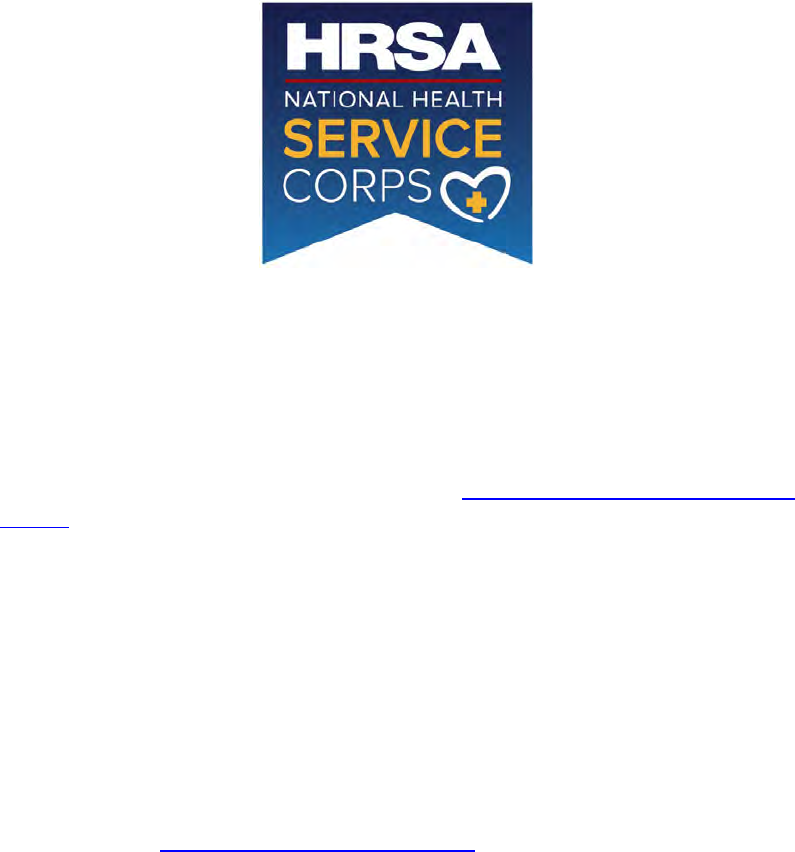
46
APPENDIX A: SITE AGREEMENT
National Health Service Corps Site Agreement
National Health Service Corps approved sites must meet the following requirements at the
time of application and must continue to meet the requirements in order to maintain status
as a National Health Service Corps-approved site.
1. Is an eligible site type for National Health Service Corps approval, and is located in
and treats patients from a federally designated Health Professional Shortage Area
(HPSA).
2. Does not discriminate in the provision of services to an individual (i) because the
individual is unable to pay; (ii) because payment for those services would be made
under Medicare, Medicaid, or the Children’s Health Insurance Program (CHIP); or (iii)
based upon the individual’s race, color, sex, national origin, disability, religion, age,
sexual orientation, or gender identity. [May or may not be applicable to Indian Health
Service, Tribal or Urban Indian Health Clinics (ITUs), free clinics, or correctional facilities].
a. Uses a schedule of fees or payments for services consistent with locally
prevailing rates or charges and designed to cover the site’s reasonable costs
of operation. (May or may not be applicable to ITUs, free clinics, or
correctional facilities.)
b. Uses a discounted/sliding fee schedule
to ensure that no one who is unable
to pay will be denied access to services, and the discount must be applicable
to all individuals and families with annual incomes at or below 200 percent of
the most current Federal Poverty Guidelines. The sliding fee schedule must
also provide a full discount for individuals and families with annual incomes at
or below 100 percent of the Federal Poverty Guidelines, with allowance for a
nominal charge only, consistent with site’s policy; Must adjust fees (partial
sliding fee discount), reflecting nominal charges, based solely on family size
and income and no other factors for individuals and families with incomes
above 100 percent and at or below 200 percent of the Federal Poverty
Guidelines. (May or may not be applicable to Indian Health Service, Tribal or
Urban Indian Health Clinics, free clinics, or correctional facilities.)
c. Makes every reasonable effort to secure payment in accordance with the
schedule of fees or schedule of discounts from the patient and/or any other

47
third party. (May or may not be applicable to Indian Health Service, Tribal or
Urban Indian Health Clinics, free clinics, or correctional facilities.)
d. Accepts assignment for Medicare beneficiaries and has entered into an
appropriate agreement with the applicable state agency for Medicaid and
CHIP beneficiaries. (May or may not be applicable to Indian Health Service,
Tribal or Urban Indian Health Clinics, free clinics, or correctional facilities.)
e. Prominently displays a statement in common areas and on site’s official
website and social media platforms (if one exists) that explicitly states that
(i) no one will be denied access to services due to inability to pay; and (ii)
there is a discounted/sliding fee schedule available based on family size and
income. When applicable, this statement should be translated into the
appropriate language/dialect. (May or may not be applicable to free clinics,
or correctional facilities.)
3. Provides culturally competent, comprehensive primary care services (medical, dental,
and/or behavioral), which correspond to the designated Health Professional Shortage Area
type. For a detailed description of culturally and linguistically appropriate services in health,
visit the Office of Minority Health website.
4. Uses a credentialing process that, at a minimum, includes reference review, licensure
verification, and a query of the National Practitioner Data Bank (NPDB) of those
clinicians for whom the National Practitioner Data Bank maintains data.
5. Functions as part of a system of care that either offers or ensures access to ancillary,
inpatient, and specialty referrals.
6. Adheres to sound fiscal management policies and adopts clinician recruitment and
retention policies to help the patient population, the site, and the community obtain
maximum benefits.
7. Maintains a clinician recruitment and retention plan, keeps a current copy of the plan
on-site for review, and adopts recruitment policies to maintain appropriate clinical
staffing levels needed to serve the community.
8. Does not reduce the salary of National Health Service Corps clinicians because they
receive or have received benefits under the National Health Service Corps Loan
Repayment or Scholarship programs.
9. Allows National Health Service Corps clinicians to maintain a primary care clinical practice
(full-time or half-time) as indicated in their contract with National Health Service Corps.
The site administrator must review and know the clinician’s specific National Health
Service Corps service requirements. Time spent on call will not count toward a clinician’s
National Health Service Corps work hours. Participants do not receive service credit hours
worked over the required hours per week, and excess hours cannot be applied to any
other work week. Clinicians must apply for a suspension of their service obligation if their
absences per year are greater than those allowed by National Health Service Corps. If a
suspension is requested and approved, the participant’s service obligation end date will
be extended accordingly. For a more detailed explanation of the full-time and half-time
clinical practice requirements, including requirements for participants working in Critical
Access Hospitals and Indian Health Service hospitals, refer to the
National Health Service
Corps website and review the respective National Health Service Corps loan repayment

48
programs (Loan Repayment Program, Substance Use Disorder Workforce Loan
Repayment Program, Rural Community Loan Repayment Program), Students to Service
Loan Repayment Program and/or Scholarship Program Application and Program
Guidance.
10. Communicates to the National Health Service Corps any change in site or clinician
employment status for full-time and half-time, including moving a National Health Service
Corps clinician to a satellite site for any or all of their hour work week, termination, etc.
11. Supports clinicians with funding and arrangements, including clinical coverage, for
their time away from the site to attend National Health Service Corps-sponsored
meetings, webinars, and other continuing education programs.
12. Maintains and makes available for review by National Health Service Corps
representatives all personnel and practice records associated with a National Health
Service Corps clinician including documentation that contains such information that the
Department may need to determine if the individual and/or site has complied with
National Health Service Corps requirements.
13. Completes and submits National Health Service Corps Site Data Tables (requires up-to-
date data for the preceding six months) to National Health Service Corps at the time of
the site application, recertification, and National Health Service Corps site visits. The
following eligible auto-approved National Health Service Corps sites ARE NOT required to
submit the National Health Service Corps Site Data Tables: 1) Federally Qualified Health
Centers, and 2) Federally Qualified Health Center Look-Alikes. The standard Health
Resources and Services Administration/Bureau of Primary Health Care Uniform Data
System (UDS) report will be reviewed in place of the data tables. The following eligible
National Health Service Corps sites must provide National Health Service Corps Site Data
Tables upon request if Health Resources And Services Administration needs them to
determine National Health Service Corps site eligibility: 1) Indian Health Service facilities,
Tribally Operated 638 Health programs, Dual-Funded (Tribal Health Clinic and Federally
Qualified Health Center 330 Funded), Urban Indian Health programs and Indian Health
Service hospitals, 2) federal prisons, 3) state prisons, and 4) Immigration and Customs
Enforcement Health Service Corps sites. All other eligible National Health Service Corps
site types must submit National Health Service Corps Site Data Tables at the time of site
application, recertification, and National Health Service Corps Site Visit.
14. Complies with requests for a site visit from National Health Service Corps or the
state Primary Care Office with adherence to all National Health Service Corps
requirements.
By signing below, you hereby affirm your compliance with the National Health Service Corps
Site Agreement, and that the information submitted is true and accurate. You further
understand that this information is subject to verification by the National Health Service Corps.
Name of Site (Print):______________________________________________________________
Site Official’s Name (Print):________________________________________________________
Site Official’s Name (Signature):____________________________________________________
Site Official’s Title:_______________________________________________________________
Date:_________________________________________________________________________

49
APPENDIX B: SAMPLE NATIONAL HEALTH SERVICE CORPS PUBLIC NOTICE SIGNAGE
National Health Service Corps-approved sites are required to inform patients of the Sliding Fee
Discount Program. The following example illustrates language to be posted prominently online
and at the physical site. The National Health Service Corps encourages sites to establish
multiple methods of informing patients. Sites can obtain more information by accessing the
Current National Health Service Corps Sites page on the National Health Service Corps webs
ite.
When applicable, sites should translate this notice into the most prevalent languages/dialects
spoken by their patients.
Public Notice Signage Example
NOTICE TO PATIENTS:
This practice serves all patients regardless of ability to pay.
Discounts for essential services are offered based on family size and income.
For more information, ask at the front desk or visit our website.
Thank you.
AVISO PARA PACIENTES:
Este establecimiento de salud atiende a todos los pacientes independientemente de su
capacidad de pago.
Se ofrecen descuentos para servicios esenciales según el tamaño de la familia y los ingresos.
Para obtener más información, pregunte en la recepción o visite nuestro sitio web.
Gracias.

50
APPENDIX C
Sample Sliding Fee Discount Program Policy, Application, and Schedule
SAMPLE SLIDING FEE DISCOUNT PROGRAM POLICY
ABC HEALTH CARE CLINIC BUSINESS OFFICE POLICIES
SUBJECT: Sliding Fee Discount Program
EFFECTIVE DATE: September 1, 2023
POLICY: To make free or discounted services available to those in need.
PURPOSE: All patients seeking health care services at ABC HEALTH CARE are assured that they
will be served regardless of ability to pay. No one is refused service because of lack of financial
means to pay. This program is designed to provide free or discounted care to those who have
no means, or limited means, to pay for their medical services (uninsured or underinsured).
ABC HEALTH CARE CLINIC will offer a Sliding Fee Discount Program to all who are unable to pay
for their services. ABC HEALTH CARE CLINIC will base program eligibility on a person’s ability to
pay and will not discriminate on the basis of an individual’s race, color, sex, national origin,
disability, religion, age, sexual orientation, or gender identity, ability to pay, or whether
payment for those services would be made under Medicare, Medicaid, or the Children’s Health
Insurance Program (CHIP) . The Federal Poverty Guidelines
are used in creating and annually
updating the sliding fee schedule to determine eligibility.
PROCEDURE:
The follo
wing guidelines are to be followed in providing the Sliding Fee Discount Program.
1. Notification: ABC HEALTH CARE will notify patients of the Sliding Fee Discount Program
by:
• Payment Policy Brochure will be available to all patients at the time of service.
• Notification of the Sliding Fee Discount Program will be offered to each patient upon
admission.
• Sliding Fee Discount Program application will be included with collection notices sent
out by ABC HEALTH CARE.
• An explanation of our Sliding Fee Discount Program and our application form are
available on ABC HEALTH CARE’s website.
• ABC HEALTH CARE places notification of Sliding Fee Discount Program in the clinic
waiting area.

51
2. Request for discount: Requests for discounted services may be made by patients, family
members, social services staff or others who are aware of existing financial hardship. The
Sliding Fee Discount Program will only be made available for clinic visits. Information and
forms can be obtained from the front desk and the business office.
3. Administration: The Sliding Fee Discount Program procedure will be administered through
the business office manager or his/her designee. Information about the Sliding Fee
Discount Program policy and procedure will be provided to patients. Staff are to offer
assistance for completion of the application. Dignity and confidentiality will be respected
for all who seek and/or are provided health care services.
4. Completion of Application: The patient/responsible party must complete the Sliding Fee
Discount Program application in its entirety. Staff will be available, as needed, to assist
patient/responsible party with applications. By signing the Sliding Fee Discount Program
application, persons are confirming their income to ABC HEALTH CARE as disclosed on the
application form.
5. Eligibility: Discounts will be based on income and family size only. We do not require
patients to apply to Medicaid/health insurance or do asset testing to qualify for the
sliding fee discount program.
a. Family is defined as: a group of two people or more (one of whom is the
householder) related by birth, marriage, or adoption and residing together; all such
people (including related subfamily members) are considered as members of one
family. ABC HEALTH CARE will also accept non-related household members when
calculating family size.
b. Income includes: gross wages; salaries; tips; income from business and self-
employment; unemployment compensation; workers' compensation; Social Security;
Supplemental Security Income; veterans' payments; survivor benefits; pension or
retirement income; interest; dividends; royalties; income from rental properties,
estates, and trusts; alimony; child support; assistance from outside the household;
and other miscellaneous sources.
6. Income verification: Applicants may provide one of the following: prior year W-2, two
most recent pay stubs, letter from employer, or Form 4506-T (if W-2 not filed). Self-
employed individuals will be required to submit detail of the most recent three months of
income and expenses for the business. Adequate information must be made available to
determine eligibility for the program. Self-declaration of Income may be used. Patients
who are unable to provide written verification may provide a signed statement of income.
7. Discounts: Those with incomes at or below 100 percent of poverty will receive a full 100
percent discount for health care services. Those with incomes above 100 percent of
poverty, but at or below 200 percent of poverty, will be charged a nominal fee according
to the attached sliding fee schedule. The sliding fee schedule will be updated during the
first quarter of every calendar year with the latest Federal Poverty Line Guidelines.
52
8. Nominal Fee: Patients with incomes above 100 percent of poverty, but at or below 200
percent poverty will be charged a nominal fee according to the attached sliding fee
schedule and based on their family size and income. However, patients will not be denied
services due to an inability to pay. The nominal fee is not a threshold for receiving care,
and thus is not a minimum fee or co-payment.
9. Waiving of Charges: In certain situations, patients may not be able to pay the nominal or
discount fee. Waiving of charges must be approved by ABC HEALTH CARE’s designated
official. Any waiving of charges should be documented in the patient’s file along with an
explanation.
10. Applicant notification: The Sliding Fee Discount Program determination will be provided
to the applicant(s) in writing, and will include the percentage of Sliding Fee Discount
Program write off, or, if applicable, the reason for denial. If the application is approved for
less than a 100 percent discount or denied, ABC HEALTH CARE will work with the patient
and/or responsible party to establish payment arrangements. Sliding Fee Discount
Program applications cover outstanding patient balances for six months prior to
application date and any balances incurred within 12 months after the approved date,
unless their financial situation changes significantly. The applicant has the option to
reapply after the 12 months have expired or anytime there has been a significant change
in family income. When the applicant reapplies, the look back period will be the lesser of
six months or the expiration of their last Sliding Fee Discount Program application.
11. Refusal to Pay: If a patient verbally expresses an unwillingness to pay or vacates the
premises without paying for services, the patient will be contacted in writing regarding
their payment obligations. If the patient is not on the sliding fee schedule, a copy of the
sliding fee discount program application will be sent with the notice. If the patient does
not make effort to pay or fails to respond within 60 days, this constitutes refusal to pay.
At this point in time, ABC HEALTH CARE can explore options not limited to, but including
offering the patient a payment plan, waiving of charges, or referring the patient to
collections.
12. Record keeping: Information related to Sliding Fee Discount Program decisions will be
maintained and preserved in a centralized confidential file located in the office of the
business manager, in an effort to preserve the dignity of those receiving free or
discounted care.
a. Applicants that have been approved for the Sliding Fee Discount Program will be
logged in ABC HEALTH CARE’s practice management system, noting names of
applicants, dates of coverage and percentage of coverage.
b. The business office manager will maintain an additional monthly log identifying Sliding
Fee Discount Program recipients and dollar amounts. Denials and applications not
returned will also be logged.
13. Policy and procedure review: The Sliding Fee Schedule will be updated based on the
current Federal Poverty Guidelines. ABC HEALTH CARE will also review possible changes in

53
our policy and procedures and for examining institutional practices which may serve as
barriers preventing eligible patients from having access to our community care provisions.
14. Budget: During the annual budget process, an estimated amount of Sliding Fee Discount
Program service will be placed into the budget as a deduction from revenue.
ATTACHMENTS:
• 2024 Sliding Fee Schedule
• Patient Application for the Sliding Fee Discount Program
APPROVAL
REVISED
REVIEWED BY
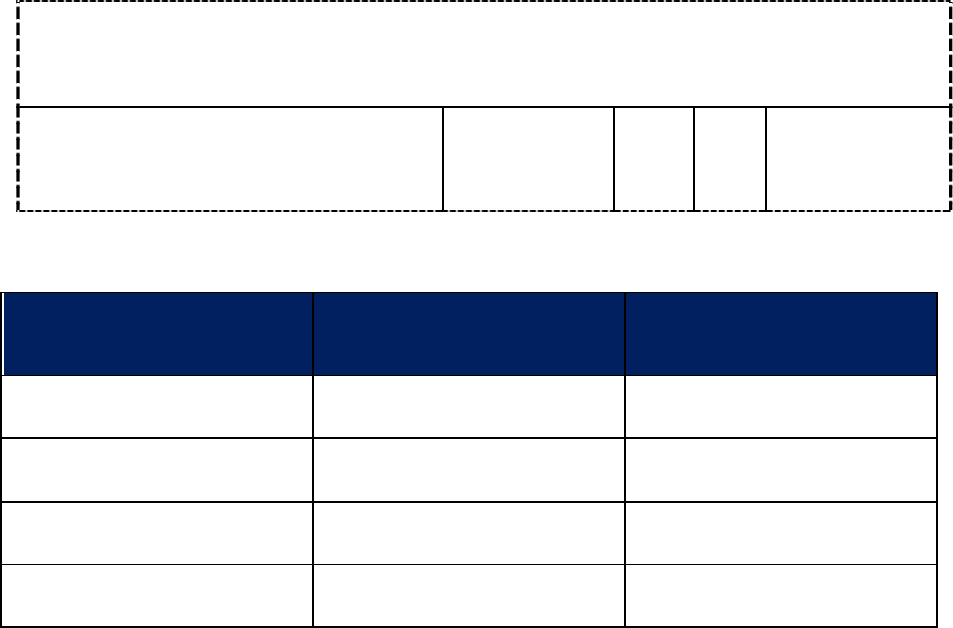
54
SAMPLE SLIDING FEE DISCOUNT PROGRAM PATIENT APPLICATION
ABC HEALTH CARE CLINIC
Sliding Fee Discount Application
It is the policy of ABC HEALTH CARE to provide essential services regardless of the patient’s
ability to pay. ABC HEALTH CARE offers discounts based on family size and annual income.
Please complete the following information and return it to the front desk to determine if you or
members of your family are eligible for a discount.
The discount will apply to all services received at this clinic, but not those services or equipment
purchased from outside, including reference laboratory testing, drugs, x-ray interpretation by a
consulting radiologist, and other such services. You must complete this form every 12 months
or if your financial situation changes.
NAME
STREET
CITY
STATE
ZIP
PHONE
Please list all household members, including those under age 18.
Name Date of Birth
SELF
OTHER
OTHER
OTHER
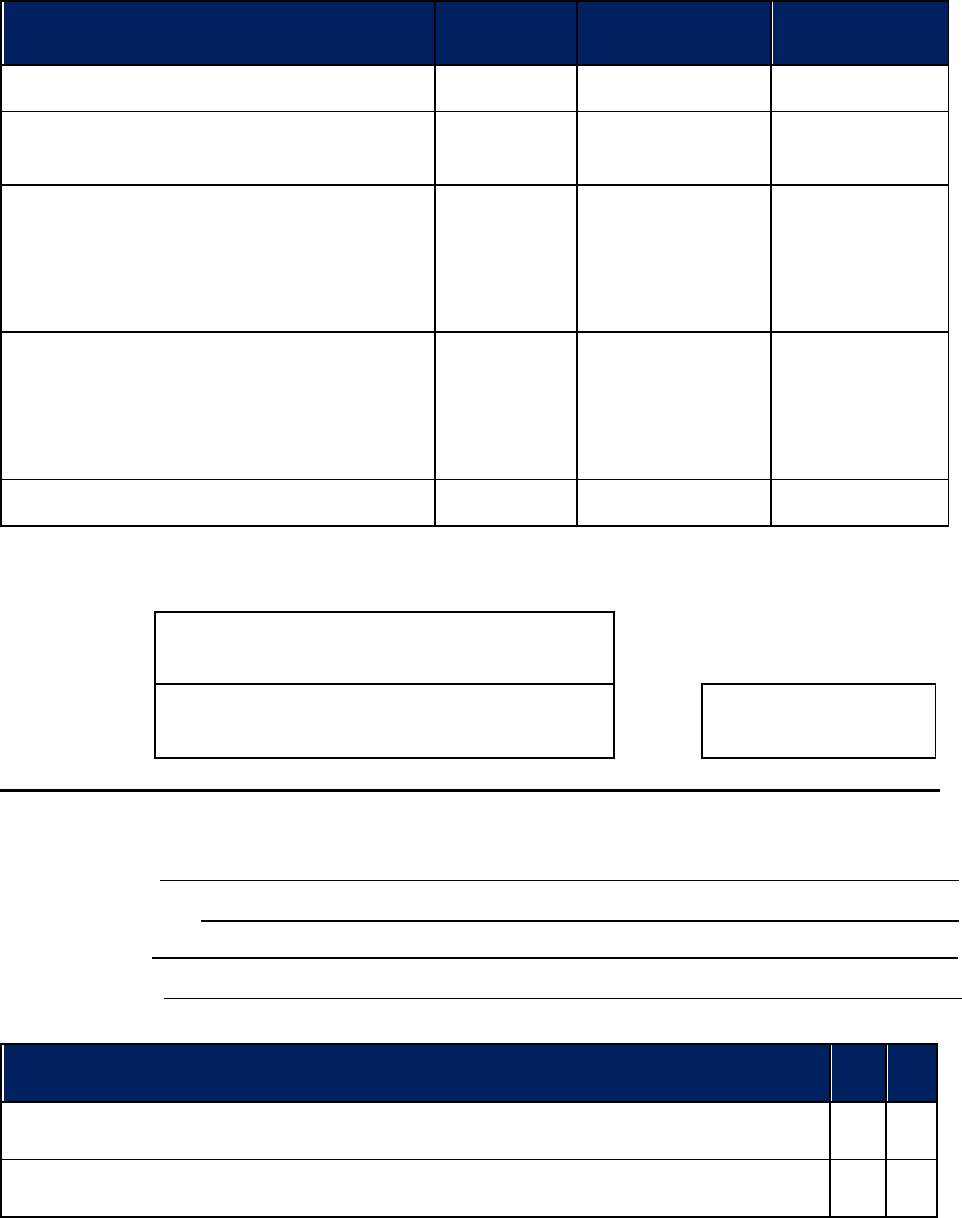
55
Source Self Other Total
Gross wages, salaries, tips, etc.
Income from business and self-
employment
Unemployment compensation, workers'
compensation, Social Security,
Supplemental Security Income, veterans'
payments, survivor benefits, pension, or
retirement income
Interest; dividends; royalties; income
from rental properties, estates, and
trusts; alimony; child support; assistance
from outside the household; and other
miscellaneous sources
TOTAL INCOME
I certify that the family size and income information shown above is correct.
Name (Print)
Signature
Date
OFFICE USE ONLY
Patient Name:
Approved Discount:
Approved by:
Date Approved:
Verification Checklist Yes No
Identification/Address: Driver’s license, utility bill, employment identification, or
other
Income: Prior year tax return, three most recent pay stubs, or other
Self-declaration of income may also be used.
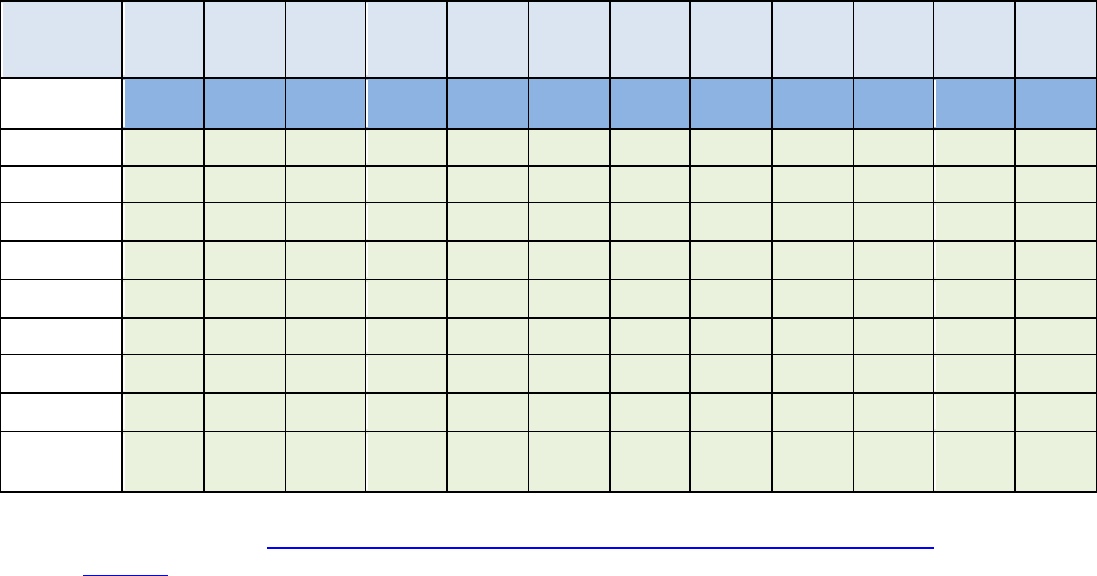
56
SAMPLE SLIDING FEE SCHEDULE
Maximum Annual Income Amounts for each Sliding Fee Percentage Category (except for 0
percent discount)
Poverty
Level
100% 110% 120% 130% 140% 150% 160% 170% 180% 190% 200% >200%
Family Size
Discount
100%
Discount
90%
Discount
80%
Discount
70%
Discount
60%
Discount
50%
Discount
40%
Discount
30%
Discount
20%
Discount
15%
Discount
10%
Discount
0%
1
$15,060 $16,566 $18,072 $19,578 $21,084 $22,590 $24,096 $25,602 $27,108 $28,614 $30,120 >$30,120
2 $20,440 $22,484 $24,528 $26,572 $28,616 $30,660 $32,704 $34,748 $36,792 $38,836 $40,880 >$40,880
3
$25,820 $28,402 $30,984 $33,566 $36,148 $38,730 $41,312 $43,894 $46,476 $49,058 $51,640 >$51,640
4
$31,200 $34,320 $37,440 $40,560 $43,680 $46,800 $49,920 $53,040 $56,160 $59,280 $62,400 >$62,400
5 $36,580 $40,238 $43,896 $47,554 $51,212 $54,870 $58,528 $62,186 $65,844 $69,502 $73,160 >$73,160
6 $41,960 $46,156 $50,352 $54,548 $58,744 $62,940 $67,136 $71,332 $75,528 $79,724 $83,920 >$83,920
7
$47,340 $52,074 $56,808 $61,542 $66,276 $71,010 $75,744 $80,478 $85,212 $89,946 $94,680 >$94,680
8
$52,720 $57,992 $63,264 $68,536 $73,808 $79,080 $84,352 $89,624 $94,896 $100,168 $105,440 >$105,440
For each
addit ional
person, add
$5,380 $5,918 $6,456 $6,994 $7,532 $8,070 $8,608 $9,146 $9,684 $10,222 $10,760 >$10,760
*
Based on the 2024 Federal Poverty Guidelines for the 48 contiguous states and the District of
Columbia. Please note that there are separate guidelines for Alaska and Hawaii, and that the thresholds
would differ for sites in those two states. Sites in Puerto Rico and other outlying jurisdictions would use
the above guidelines.
57
APPENDIX D: MEDICATIONS FOR OPIOID USE DISORDER ATTESTATION LETTER
TEMPLATE
ORGANIZATION LETTERHEAD
DATE:
FROM:
RE: Attestation to provision of Medications for Opioid Use Disorder
TO: National Health Service Corps
[INSERT BRIEF OVERVIEW OF SITE (AND ORGANIZATION IF APPLICABLE) AND SERVICES
PROVIDED AND PATIENT POPULATION].
This letter is to certify that [SITE NAME] located at [SITE ADDRESS] provides Medications for
Opioid Use Disorder (MOUD) in an outpatient clinical setting. Medications For Opioid Use
Disorder services are available to patients [INSERT DAYS AND HOURS OF OPERATION FOR
MEDICATIONS FOR OPIOID USE DISORDER]. At this clinical service site, the Medications For
Opioid Use Disorder patient panel for the six-month period beginning [START DATE] and ending
[END DATE] included [# OF PATIENTS RECEIVING MEDICATIONS FOR OPIOID USE DISORDER].
[INK OR E-SIGNATURE OF CEO AND/OR MEDICAL DIRECTOR]
[PRINTED SIGNATOR NAME]
[POSITION/TITLE]
[ORGANIZATION]
58
APPENDIX E: SAMPLE PATIENT NON-DISCRIMINATION POLICY
Site ABC will not discriminate in the provision of health care services to an individual:
1. Because the individual is unable to pay for the health care services;
2. Because payment for those services would be made under Medicare, Medicaid, or the
Children’s Health Insurance Program (CHIP); or
3. Based upon the individual’s race, color, sex, age, national origin, disability, religion, gender
identity or sexual orientation.

59
APPENDIX F: SAMPLE CLINICAL RECRUITMENT AND RETENTION PLAN
Recruitment Policy
Site ABC will recruit clinical staff needed to appropriately serve the community.
Recruitment Processes
1. Enter your top 1 recruitment process/strategy
2. Enter your top 2 recruitment process/strategy
3. Enter your top 3 recruitment process/strategy
4. Enter your top 4 recruitment process/strategy
Retention Policy
Site ABC will maintain clinical staffing levels needed to appropriately serve the community.
Retention Processes
1. Enter your top 1 retention process/strategy
2. Enter your top 2 retention process/strategy
3. Enter your top 3 retention process/strategy
4. Enter your top 4 retention process/strategy
Strategies aimed at promoting clinician resiliency and reducing burnout
□ Enter your top 1 process/strategy aimed at promoting clinician resiliency and reducing
burnout
□ Enter your top 2 process/strategy aimed at promoting clinician resiliency and reducing
burnout
□ Enter your top 3 process/strategy aimed at promoting clinician resiliency and reducing
burnout
